This performance of Lily Hall, from my new choral work ‘7 Songs of Hebden Bridge’ was given by Hebden Bridge Little Theatre choir. The song tells the story of my great great grandparent, Elizabeth Ann Whitham who was born in Lily Hall, Heptonstall in 1842.
Category: Ancestry (Page 7 of 8)
Newspaper articles mentioning Samuel, (my gt gt grandfather 1863-1921)) John, his brother (my gt gt uncle,1848-1925) and brother Daniel Frederick Denton, (my gt gt uncle, 1846-1912) and their father Daniel Denton (my gt gt gt grandfather, 1804-1869).
Stroud Journal – Saturday 25 April 1868
CHALFORD INSTITUTE. The course of lectures and entertainments arranged by the committee of this Institute was terminated on Thursday evening. It is not long since that we recorded the opening of the society under very favourable auspices, and the success that has attended it until the present time has exceeded in every respect the sanguine expectations of its warmest friends and supporters. Previous to its formation Chalford lacked the means of affording useful information and rational recreation to its inhabitants generally, and it is encouraging to find that the efforts made to supply this want have been largely appreciated and are still highly-valued. The arrangements for the winter season were entered into with much spirit and discretion, and carried into effect in a manner that has elicited entire satisfaction. The committee have evidently taken ” Excelsior” as their motto, and determined that every bill of fare should be superior to the one that preceded it. With commendable wisdom they reserved the best evening’s entertainment yet given, with which to close the programme of the season. It was a decided success; everybody seemed to enjoy it most heartily, and if the enthusiastic applause that greeted the execution of each selection is to be taken as a criterion the audience were never happier or better satisfied in their lives. The mom in which these gatherings are usually held being too small to accommodate the large number that on almost every occasion seek admission, it was deemed desirable to overcome this difficulty by securing the spacious schoolroom belonging to and adjoining France Chapel, Chalfont Kill, which was kindly placed at the service of the committee. Although this building is some considerable distance from the centre of the village, and has to be reached by walking up a steep hill, that reminds the pedestrian of climbing to the summit of a mountain, it was well-filled some time before the hour for commencement. Mr. W. Dangerfield, the respected President of the society,—and whose deep interest in its welfare remains unabated—in stepping forward to address a few words was received by the audience in the warmest possible manner. He said they were met to enjoy the last entertainment of the season, and the great success which had attended the formation of the Institute was encouraging to the offers and committee, and afforded them much satisfaction. It was a proof that their labours had not been in vain, and he hoped that in the future the society would increase in numbers and usefulness. Not to be behind other societies in the neighbourhood they contemplated holding an open air fete in the course of the summer, publicity of which would be given in due course. He trusted that the library belonging to the Institute was properly valued, and if at any time any member should have a complaint to make, or a suggestion to offer for its improvement, and would convey it to the right quarter, it would immediately receive at the hands of the committee the attention which it deserved. The reading-room would remain open during the summer season the same hours as it had through the winter months. He wished, before sitting down, to congratulate them on the accession to their numbers of several lady members, and he trusted that the fair sex would continue to support the society, and manifest constant interest in its progress. (Loud cheers.) The musical entertainment then commenced, and was under the efficient direction of Mr. Samuel Denton of the Thrupp,

Samuel and Joanna Denton about 1863
to whose skill and labours the committee and the audience were indebted for the excellent treat provided. The four glees “Hark the lark.” ” I love my love,” ” May day,” and ” From Oberon” went off smoothly and well, the second being loudly encored. The trio “Winds gently whisper” by Mr. D. Denton and his sons was nicely sung and well received. Mr. G. Warner sang with much feeling “My own, my guiding star” for which he was rewarded with warm acclamations. The duet “Tell me where is beauty found” was sung by Mrs. and Miss Morse. These ladies are well known to Stroud audiences, and they had not done with the execution of their task at Chalfont before the company became delighted with their performance. On each appearance, whether together or alone, they were warmly encored. Mr. J. Denton’s cornet solo, “Le Carnival de Venice,” was highly-appreciated for the skilful manner in which it was executed. This was followed by a duct given by Messrs. S. and D. Denton ” I know a bank.” The appearance of Mr. Charles Gardner in ” The Bay of Biscay” brought down the house. He sang in his own hearty style ; and being repeatedly redemanded, gave ” Kit the Cobbler,” which seemed immensely to amuse the audience. In the second part of the programme, Mr. Gardner was equally well received, and sang even more effectively than before. His song was “The Mermaid,” the chorus being taken up by the audience with great gusto. Again he was encored, and gave that sensible song Do as you would be done by,” resuming his seat amidst the plaudits of an appreciative assembly. Miss Morse was redemanded in her effective rendering of ” The bailiff’s daughter.” The singing of the duet “The Gipsy Countess”—Mrs. Morse and Mr. Denton—was a most pleasing part of the entertainment. The nice style in which it was done enamoured the audience, and they demanded its repetition. Mr. D. Denton was encored in his singing of “The death of Nelson.” The programme was exhausted by ” The tickling trio,” the parts being taken by Messrs. Teakle, Warner, and Govier. The audience caught the contagion, and roars of laughter at times drowned the voices of the singers. If the audience desired to show their appreciation of a selection of good music, by repeated encores, they did it with a vengeance, for out of a programme of fourteen pieces there were no less than eleven redemanded, in each case the request being complied with. Mr. T. Law’s moved a vote of thanks to Mr. Denton and his friends, for their excellent entertainment, kindly given at the cost of much time and labour. Mr. Drew, Jun., seconded it, Mr. W. Dangerfield supporting, and putting it to the meeting. It is needless to say that it was carried with the utmost enthusiasm. Other votes of thanks were also carried, including, amongst the number, one to Mr. Dangerfield for the valuable help he had rendered in promoting in every way the prosperity of the society. The recipients having suitably acknowledged the .votes, the entertainment was concluded, by the company singing ” God save the Queen.”

Samuel and Joanna in later life – and their dog!
Samuel and Joanna in later life – now living in Ardwick, Manchester
Stroud Journal – Saturday 07 August 1869
Mr. Daniel Denton, of the Thrupp, died yesterday (Friday) morning from the result of a singular accident. He ran a tenter hook into his thumb a fortnight ago, and slight though the accident wax it led to mortification, and then death. Mr. Ball held a formal inquest at the Fountain inn, the Thrupp, last evening.
(My gt gt gt grandfather)

Daniel’s wife, Elizabeth, born in 1806.
Stroud News and Gloucestershire Advertiser – Friday 24 May 1872
STROUDEND CHURCH AND SCHOOL. In noticing the Whitsuntide festivities which took place in connection with the Stroudend National School, we cannot allow this opportunity to pass without taking a somewhat retrospective glance at the spiritual and educational condition and requirements of this portion of the borough of Stroud. As our readers are aware, the spiritual wants of the inhabitants have been in a great immure provided for, by the erection some few years ago of the Iron Room which was designed in the first place by the Rev. T. D. Wintle as an orphanage, but on the re-building the Stroud Parish Church, it was kindly placed by him at the disposal of the inhabitants of the district, and he generously gave his services gratuitously. On his retirement Mr Croome purchased the building, and it has been continued by him ever since as a kind of Chapel of Ease to the Church at the Shad. Of late years, however, owing chiefly to the rapid springing into existence of the Uplands, and the consequent increase in the population of this suburb, the general school accommodation of the town was found to be both inconvenient and inadequate, and on this account, and doubtless stimulated by the late Education Act, some of the leading gentry of the neighbourhood, principal amongst whom were Mr. T. M Croome, the respected minister of the Iron Room ; the Rev. R. D. Mono , vicar of the Sled ; and Mr. William Capel, of the Grove, acted as a committee for erecting a suitable school, the first-named gentleman generously giving the land ; and after certain negotiations Mr. John Berryman was ultimately accepted both as architect and builder. The work was at once proceeded with, and on the 22nd of December last the opening of the present Stroudend National School was inaugurated. The school is a stone building, in a very plain ordinary Elizabethan style, with an open span roof, boarded and varnished, the whole of which is wrought. It is 45 feet long, by 25 feet wide in the clear, and 12 feet high in the side walk The cost of the building including the land and everything, we understand was about £400. Soon after the school had been erected, it was thought clearable to desirable to remove the Iron Room from its somewhat isolated position in the Slad Road to where it would be in closer proximity to the school, and this was accordingly effected a month or two after the opening of the latter, and now both stand contiguous to each other, at the Uplands. The church—or rather the Iron Room, by which it is better known—is now well filled at every service, many worshippers from the more central parts of the town flocking together to hear the outpourings of a generous and truly Christian heart, for none can deny that the beloved minister, Mr. Croome, is imbued with those virtues, seeing that he not only devotes his whole heart and soul to the spread of God’s Word, for no stipend whatever, but visits the parishioners, and in fact perform the general work of a clergyman ; while in a great measure he pays the necessary expenses of the building in which he so faithfully, so zealously, and so successfully, carries on his ministry. In connection with this place of worship, a choir is formed, and hitherto has been under the gratuitous tuition of Miss Davies, whose untiring energy in the cause of both the church and school has been equalled only by that of the worthy minister himself. She has, indeed, brought out the members of the choir to a state of efficiency alike creditable to her own exertions as to themselves, and though we cannot but regret that she has relinquished her onerous post, yet at the same time we cannot but feel satisfied that the arduous duties of each an office has been taken out of her hands. We indeed, trust that her self-denying efforts may be directed in an equal degree, in some other channel perhaps more congenial to her taste and feelings, to the furtherance of God’s work. Mr. Samuel Denton has been appointed choir master, to succeed Miss Davies, and if he devotee the same painstaking energy to the choristers which his predecessor has done, success will undoubtedly crown his efforts. The services at the Iron Room are of a most hearty character, and are conducted on Church of England principles, but as the Minister has not taken up all the Church degrees, he is prohibited from reading some portions of the Prayer Book services, and they are necessarily omitted. A fine-toned harmonium accompanies the choir, which is alternately presided at by Miss Card and Mr. George Holloway, jun. The hymnal in use is ” Hymns of Grace and Glory,” which was compiled by the Rev. Graves Walker, the newly-appointed pastor of Trinity Church. As to the school, we have already stated that it was opened some four or five months ago, and we can truly say that even in this short period, it as already proved its necessity. Though no old school previously existed, there is now something like a hundred scholars. Mr.

Louis Denton and sister Kathleen on the bench dedicated to Samuel Denton and his son Herbert Vernon at Holy Trinity Church, Stroud. The bench is no longer there. Photo by Bernard Denton, Louis’s son, taken October 1989
and Miss May are the respective master and mistress, and under their supervision the school appears to be kept in good order, and the children soundly and intelligently taught. A Sunday School is held in the same building on that day, which is well attended both by the day scholars and others. In both the Church and School an able auxiliary has been found in Mr. C. Card, who devotes a great deal of attention to their welfare. A drum and fife band has also been formed out of the scholars, under the bandmastership of Mr. Govier, and considering that the performers are all young lads, and that they have been under training only a few months, we must congratulate, both master and boys on the high pitch to which they have attained. But to our theme. The children both of the Day and Sunday Schools assembled at the school-room on Whit Monday afternoon, to the number of about 150. A number of prizes were presented to them by the Rev. R. D. Monro, and some brief addresses were made by that gentleman and Mr. Croome. This being over, they arranged themselves in processional order, and headed by their respected minister, marshalled by the several teachers, and accompanied by their drum and fife band, marched round the Uplands and the neighbourhood, the band playing some very lively tunes in first-rate style. The procession was relieved at intervals with flags and bannerettes, bearing suitable mottoes and texts, in varied colours, amongst which we noticed, “By love serve one another.” ” Righteousness exhalteth a nation,” ” Let brotherly love continue,” and “Hitherto the Lord hath helped us,” whilst one neat design bore the words, “Stroundend Sunday School.” When this marching along was concluded, all adjourned to the schoolroom to partake of a bountiful supply of cake and tea., and which had been in the meantime provided under the superintendence of Mrs. Croome, Mrs Lindsey Winterbotham, and Miss Davies. The little ones, of course, enjoyed this part of the proceedings immensely, their pleasure being undoubtedly enhanced by the many kind words a which ever and anon fell from the lips of their generous benefactors, who, as well as the teachers, were most assiduous in caring for the wants of the children. After tea they proceeded to a field near Mr. Haycroft’s house, but there came such a downpour of rain which compelled then, to return to their school The band, however, and some of the children marched to the Sled, and, on returning, were reinforced by the drum and fife band connected with the village. In this amalgamated form they again discoursed sweet music in and about the Uplands, bringing their performance to a close near the school about nine o’clock, and from whence the Sled band went home. A further supply of refreshments had been provided in the school, and the children were entertained a second time. A few remarks were then made by Mr. Croome, and the children having sang the National Anthem and given hearty cheers for their benefactors, this happy juvenile gathering dispersed, evidently delighted at the day’s proceeding, even though somewhat “dampened” by the occasional showers which visited us. On Whit Tuesday, a musical entertainment was given at the Stroudend School, by the members of the choir and some friends. The room was filled with a highly appreciative audience, and the following was the programme :
Selection: Darling Nellie Gray
Glee: Men of Harlech – The Choir.
Song: Excelsior – Mr. S. Denton.
Pianoforte Duet -Overture from “Il Tancredi.” Miss F. Davies and Miss C. Handley. Song: Angels ever bright and fair.” Mrs. Croome.
Vocal Duet: Music and her Sister Song. – Miss Davies and Mr. S. Denton.
Song: The Pilot.” – Mr. Govier
Vocal Duet-” The Swallow’s Flight.” – Mrs and Miss F. Croome.
Part song: God bless the Prince of Wales – The Choir.
Selection-” The Warrior’s Joy.” – The Band.
Song- “The Dream.” Mrs Croome
Glee: “See our oars with feathered spray” – The Choir.
Pianoforte Duet: Miss C. Handley and Miss Davies.
Song: “The Blacksmith’s Son” – Mr. Govier.
Duet: “What are the wild waves saying?” Miss Davies and Mr S. Denton.
Chorale: “Slow In the Eastern Sky,” The Choir.
Vocal Duet: “The Elfin Echo” Mrs. and Miss F. Croome.
Song: “An Englishman am I” – Mr. S. Denton.
The National Anthem.
The various pieces were capitally performed throughout, especially taking into consideration that several of the artists made their debut in public on this occasion. In the fine song of the ” Pilot ” Mr. Govier’s vocal powers were heard to great advantage, and evoked a hearty encore. Mrs. Croome received a like compliment in her song of ” The Dream,” which was very nicely rendered, and in response sang “The Danube River” with charming effect . In the glee ” See our oars,” the choir were re-demanded and Mr. Govier shared his former fate in singing ” The Blacksmith’s Son “—he was loudly encored. Mr. Denton, too, met with quite an ovation after his second song, and replying he gave his old favourite, “The Village Blacksmith” with great spirit and vigour. Miss Davies sad the other performers were more or less cordially welcomed, and without exception the entertainment passed off admirably and gave general satisfaction. After the entertainment, the singers were invited by Mr. Croome to supper, where they were treated in the most liberal manner, the choicest of viands being placed at their service. A pleasing feature in the evening’s entertainment was the presentation to the pastor of a handsome Bible and Prayer Book, by the teachers of the Sunday School. Mr Croome, who was evidently taken by surprise and labored under considerable emotion expressed his heartfelt thanks to the teachers for their valuable present and spoke of the high esteem in which hw should ever regard the books though he felt that he was hardly deserving of such a gift. He also spoke at some length on the great assistance he had received from miss Davies, paid a well deserved complement to her for her zeal and Christian piety and returned her his most heartfelt thanks. In the course of the proceedings votes of thanks were accorded to Miss Card and Mr George Holloway, jun., for their kind assistance in presiding at the harmonium; also to Mr Govier for his perseverance with the band; and suitable presents were also given to the five most regular attendants at choir meetings. Benjamin Evans, Andrew Price and Alfred and Maury Bemis. Altogether the Whitsuntide festivities of 1872 will long be remembered in connection with the Stroudend church and school and we hope it will be but the inauguration of many more equally bright and happy Whitsuntides in the future.
Stroud News and Gloucestershire Advertiser – Friday 15 June 1877
THE WHITEHALL CONCERT. —The boys of the Whitehall school broke up on Wednesday for their few weeks of midsummer holiday, and yesterday there were shown in the room the pencil and crayon drawings which they have executed during the half-year under Mrs. Chapman’s supervision. The collection was numerous, and suggested care and industry and intuitive power on the part alike of the teacher and the pupils. A ” Diana Vernon,” by Mabbett, was shown by Mr. Norton in George-street. We may mention also a couple of dogs after Landseer, a French hound, and an “Ecce Homo” that were very beautiful ; the landscapes , too were neat; and some copies of “Our Jack” and a winter scene from music sheets were creditable, as were likewise two copies of a sick terrier and rats. Last evening, at seven o’clock, the boys and their parents and sisters and friend, crowded into the Bedford-street chapel schoolroom, lent for the purpose, and formed for two hours a thoroughly interested set of listeners to the items of a long programme offered to them by a numerous glee party made up of the pupils and helpers, old and young, girls and men and women. The scene was merry, for the boys had come to listen and laugh and clap, and they carried out their purpose to the full. The Rev. J. Park took the chair, and the conductor and accompanyist was Mr. Samuel Denton.
The programme ran thus:
duet pianoforte. Miss Holmes and Mr. Denton ;
part song, “The village choristers,”
glee, “May Day;”
duet, “Come o’er the moonlit sea,” Miss Burrell and Master Smart ;
song, “Oh ! charming May,” Miss Bessie Chaman
quartet, “Come where the cowslip bloweth,” Miss Burrell, Master Smart, and Messrs. Denton and Nash ; Samuel’s wife’s maiden name was Nash and she had 14 siblings!
part song, ” Let the hills resound,” song,
“Oh, how delightful,” Mrs. Powell;
duet, “I know a bank,” Misses Chapman and Burrell ;
glee, ” The chough and crow” ;
song, ” The mail of Arcadie,” Miss Kate Marmont ;
song, ” Love’s request,” Mr. Denton;
trio, “Winds, gently whisper,” Miss Beane Chapman, Master Smart, and Mr. Gooier ; song, ” Hark the evening belle,” Miss Burrell ;
part song, “I love my love.”
Then Mr. Philip Powell stepped from a side room, and his pleasant face was the occasion for a general clap, and everybody laughed as he sang ” I’d like to be a little boy again,” accompanied by his wife, and he had to go back again and give the comic song, ” They all have a mate but me;” and, after the glee ” From Oberon in fairy-land,” he and she repeated the effect by the duet, ” Love and pride,” and were called for again, but had to excuse themselves. Then the national anthem was sung, and the concert was over about nine o’clock. There had been some speaking during the evening. The chairman had said a few words, and Mr. Thompson had offered thanks to him and to the chapel trustees and to those who helped in the singing. The master of the Whitehall school likewise, the Rev. W. Chapman, had spoken thus as to his work and his pupils—”The school that I have for some years conducted is this town testifies to its practical usefulness. With honest pride, I can point to many young men educated at Whitehall who are honourably making way in the various spheres they occupy. It is a source of real pleasure to myself to know that their scholastic career is a pleasant memory. Many are the seductions that parity young persons into wrong courses; but I do not know a boy at present under my care whose future is not hopeful– and this is much to say. I regret that classics are at a discount in Stroud, and that boys do not remain a longer period at school before they fluidly leave their studies. Stroud manufacturers make goods that will sell—little now of the old broadcloth once so famed. So teachers are compelled to educate their pupils for immediate utility in the counting house and other commercial spheres. Yet their refined tastes, accurate knowledge, and true perseverance find an ample remuneration—perhaps more ample than is the eve in professional life. Hereafter, none but boys who will endeavour to learn and work and who can appreciate what I can teach them shall remain in my school. My reason for this determination is that I wish to be more deeply graven still on the hearts of those who during the remainder of my career shall be my scholars. I can bide my time for select pupils, and, if my health holds good, I will.” A charge was made for the tickets in order that the profits might be given to the Stroud Hospital.

For all the problems, issues of privacy associated with the World Wide Web and Social Media, good things can happen. For the past 8 years I’ve been tracing my ancestry. There were always family stories about the Denton family being ‘musical’ as it was so nicely termed but neither my dad or his dad played an instrument, though there was an ancient piano in my grandma Denton’s parlour. Unfortunately no photos of this ancient instrument with its yellowing ivory keys and brass candlesticks survive. I knew that my great grandad had been organist and choirmaster at St Paul’s Astley Bridge but it wasn’t until I went there with Rachel in 2010 that I got to play that organ, saw his books in the organ bench, saw the stained glass window dedicated to him and . . .discovered a framed headshot of the man himself just lying there in a tattered box on top of a cupboard in the vestry. He looked so much like his grandson – my dad.
Fast forward to a couple of months ago when I received a message from a Denton on Ancestry.com from someone whose granddad was the organist’s brother! Last Sunday I spent a wonderful day with him and his wife delving into our family’s history. They came bearing lots of photos and handwritten documents which, of course, has recharged my interest in this side of my family tree.  This is Elizabeth Denton, the organist’s grandmother. She was born in the Cotswolds in 1806!
This is Elizabeth Denton, the organist’s grandmother. She was born in the Cotswolds in 1806!
 Her son, Samuel and his wife Joanna. – perhaps newly weds. If so, the date is 1863. They began life in Stroud, Gloucestershire but between 1877 and 1880 they moved to Lancashire, to the Manchester area. This was during the height of the industrial revolution in Manchester. Perhaps he thought there’d be more work for him up North.
Her son, Samuel and his wife Joanna. – perhaps newly weds. If so, the date is 1863. They began life in Stroud, Gloucestershire but between 1877 and 1880 they moved to Lancashire, to the Manchester area. This was during the height of the industrial revolution in Manchester. Perhaps he thought there’d be more work for him up North.

Here’s his business card. That’s his home address.
Samuel and Joanna had 12 children. That cannot have been easy on an organ tuner’s income, though he designates himself as a ‘professor of piano’ on Census returns so presumably he taught piano too.

Before he moved up North he had made a list of all the organs he tuned in 1877. Rachel and I visited the one in Rodborough in 2011, and took a photo of the organ, little knowing that Samuel had worked on it.

Organ at Rodborough – taken in 2011
 This photo, taken in 1989, shows Samuel’s grandson on a bench at Holy Trinity Church in Stroud. The dedication on the bench reads ‘In memory of Samuel Denton, 1843-1921, and his son, Herbert Vernon, 1873-1961.’ Unfortunately the bench is no longer there.
This photo, taken in 1989, shows Samuel’s grandson on a bench at Holy Trinity Church in Stroud. The dedication on the bench reads ‘In memory of Samuel Denton, 1843-1921, and his son, Herbert Vernon, 1873-1961.’ Unfortunately the bench is no longer there.
I wrote a work for concert band about my family ‘Memoirs.’
St Paul’s, Astley Bridge was celebrating its 170th anniversary and not only had I been invited to attend, but a member of the church had opened her home to me and I was able to stay with her.
My great grandfather had been organist and choir master here for 35 years and in previous visits I’d played the organ there – and also found some of his music in the organ bench.
The mayoress came in her chauffeur driven limo to open the event. In the church yard the bunting was out, the beer was flowing – and inside the ladies had been busy baking 90 scones for the afternoon tea-party. So English, it hurt!
[wpvideo alEhxf2C]
A trio of talented junior school children entertained in the church while to boy in front of me read his bible.

Then a local dance group put on quite a show. The exuberance in this boy’s face was magic.
What better for a sunny Saturday afternoon but to soak Vicar Nick. Rachel and I went to his inauguration in 2011.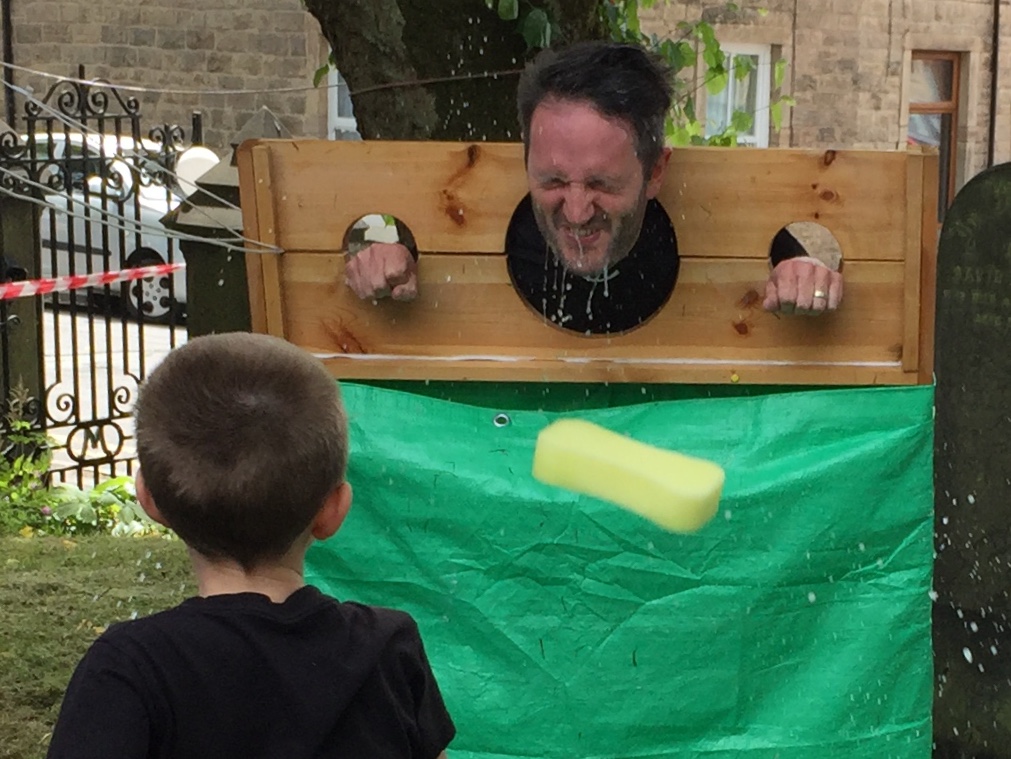
[wpvideo d2XA7bX3]
Eagley Brass band were on hand with a selection from Jeff Wayne’s War of the Worlds.
My home for the night was an almshouse, built by a local benefactor in 1839, for widows of good standing.
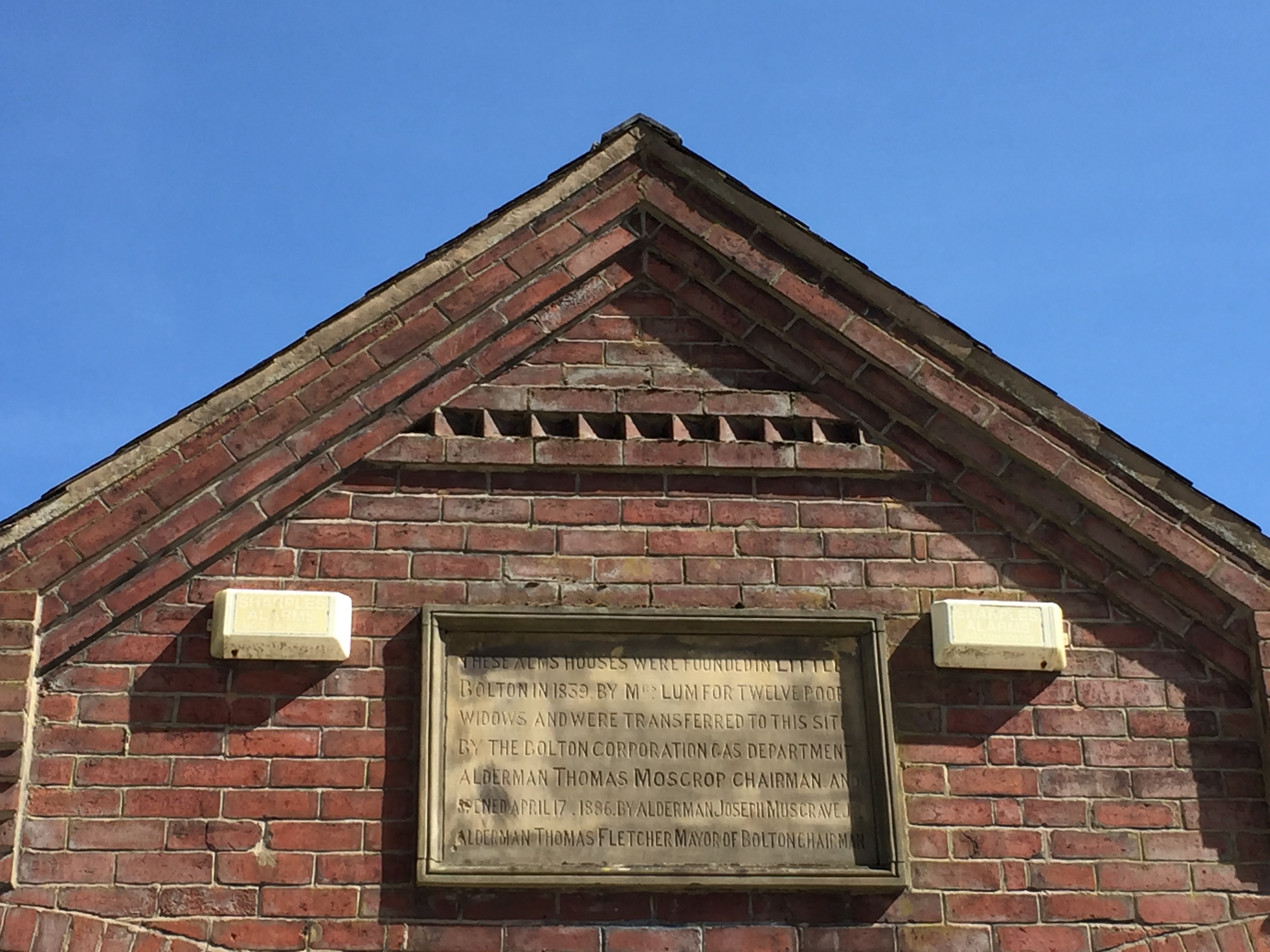
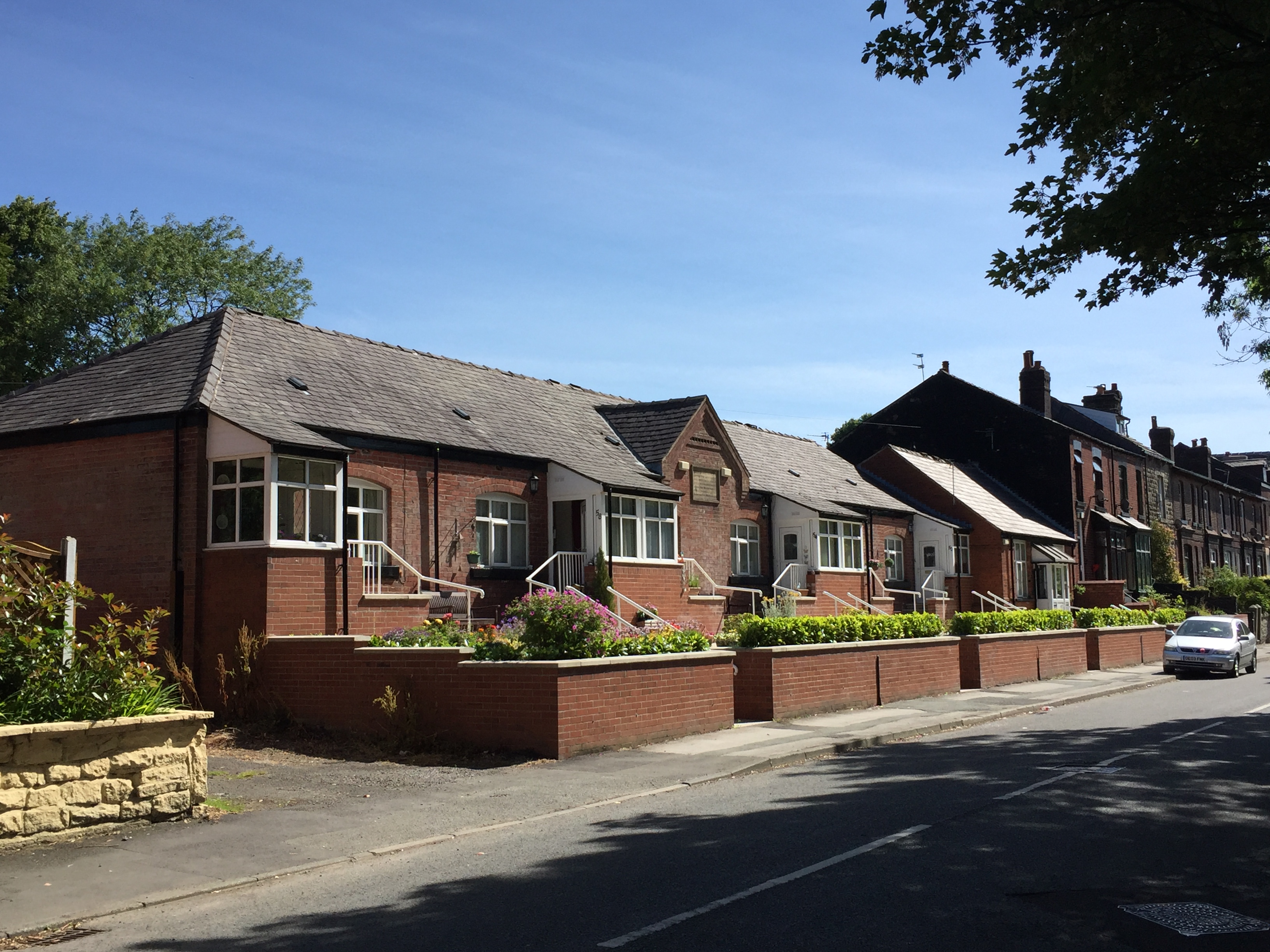
By chance Sunday morning’s church service featured a christening – in the font where my dad was baptised in 1920, when his grandad would have played the organ for the service.
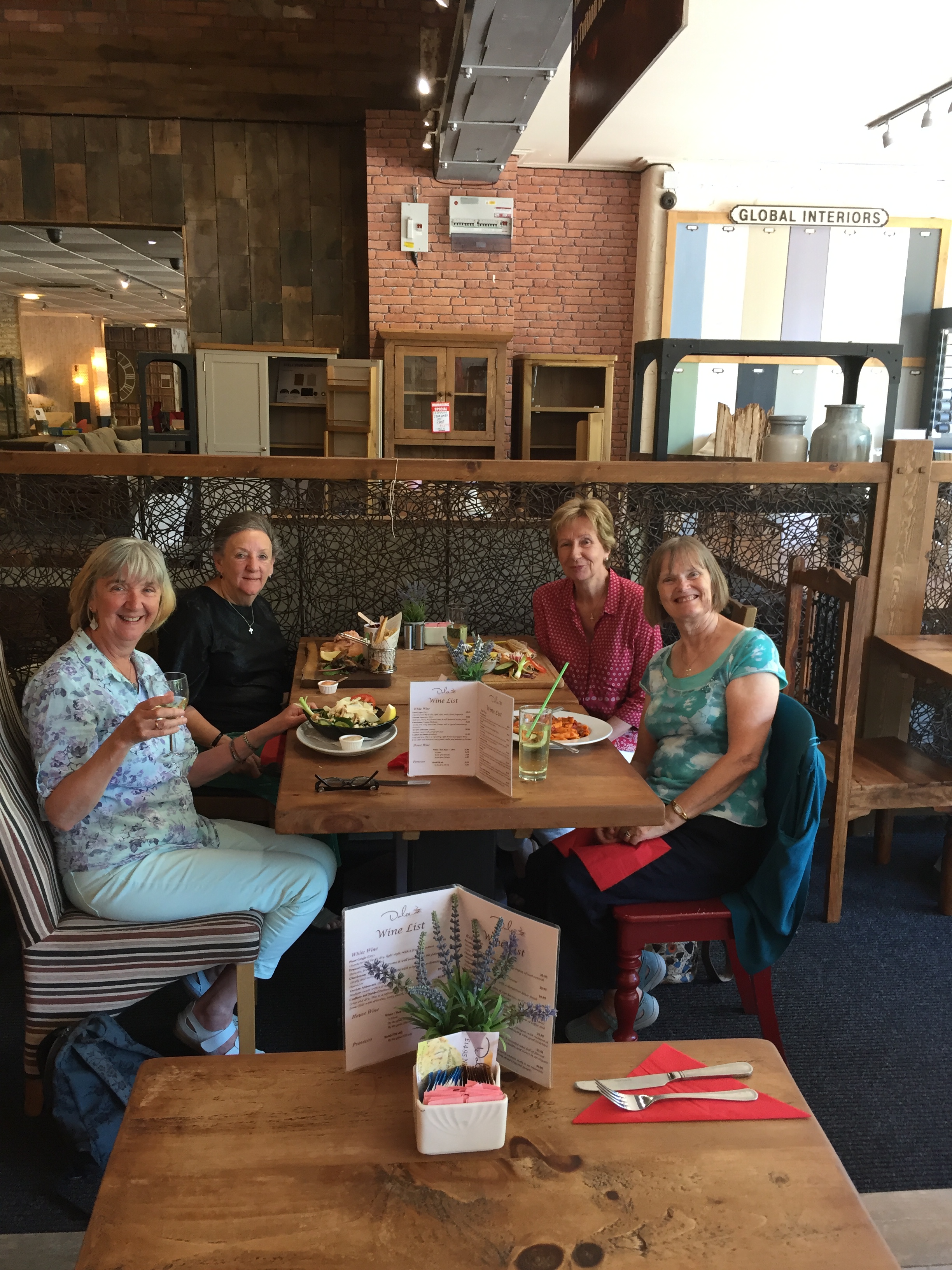
My hosts and I had lunch after the service and then they drove me back to Hebden. It had taken me almost 4 hours to get to St. Paul’s on Saturday morning by 2 trains and 2 buses but it took just less than an hour by car!
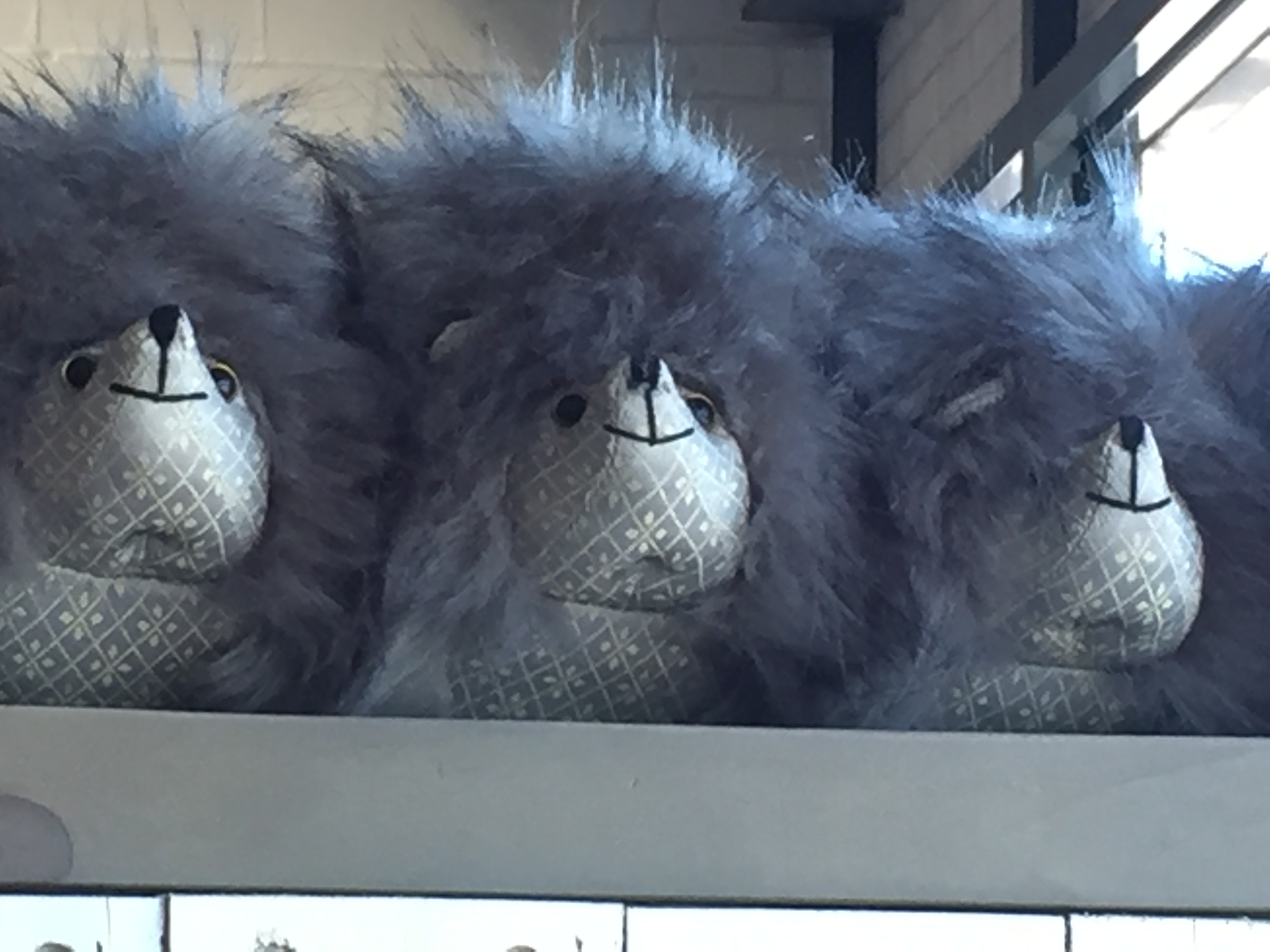
At lunch we were watched over by a doorstopper of – what else? – hedgehogs, or as Sylvia calls them – hodgehegs!
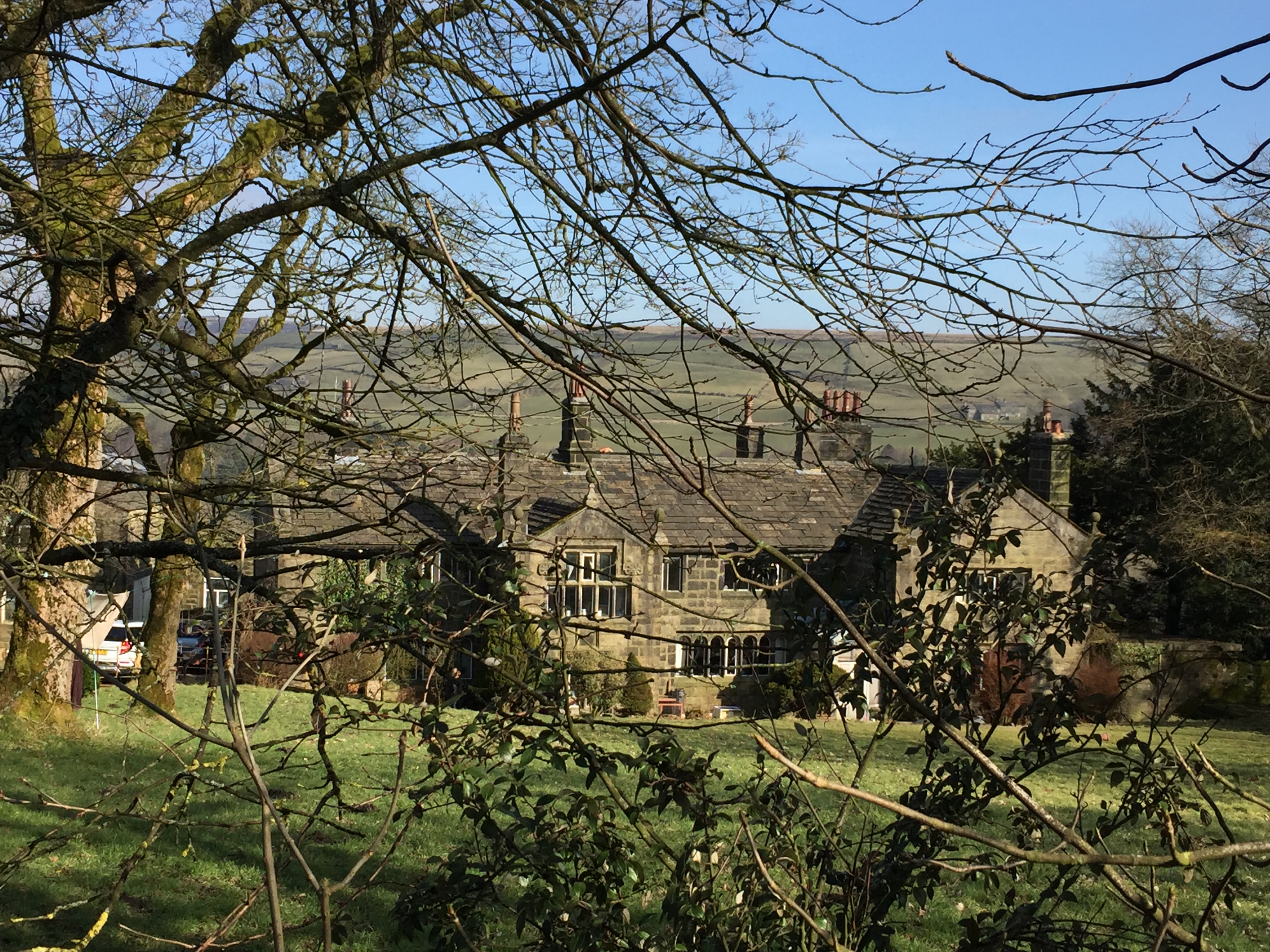
This amazing building, first built in the 11th century is currently for sale. I spent a wonderful morning there with the owner. She’s been approached by several film companies scouting for locations.

This gives an idea of its location – way out on the moors

The parents of the last Abraham Gibson (undated – courtesy of the Hebden Bridge History Society)
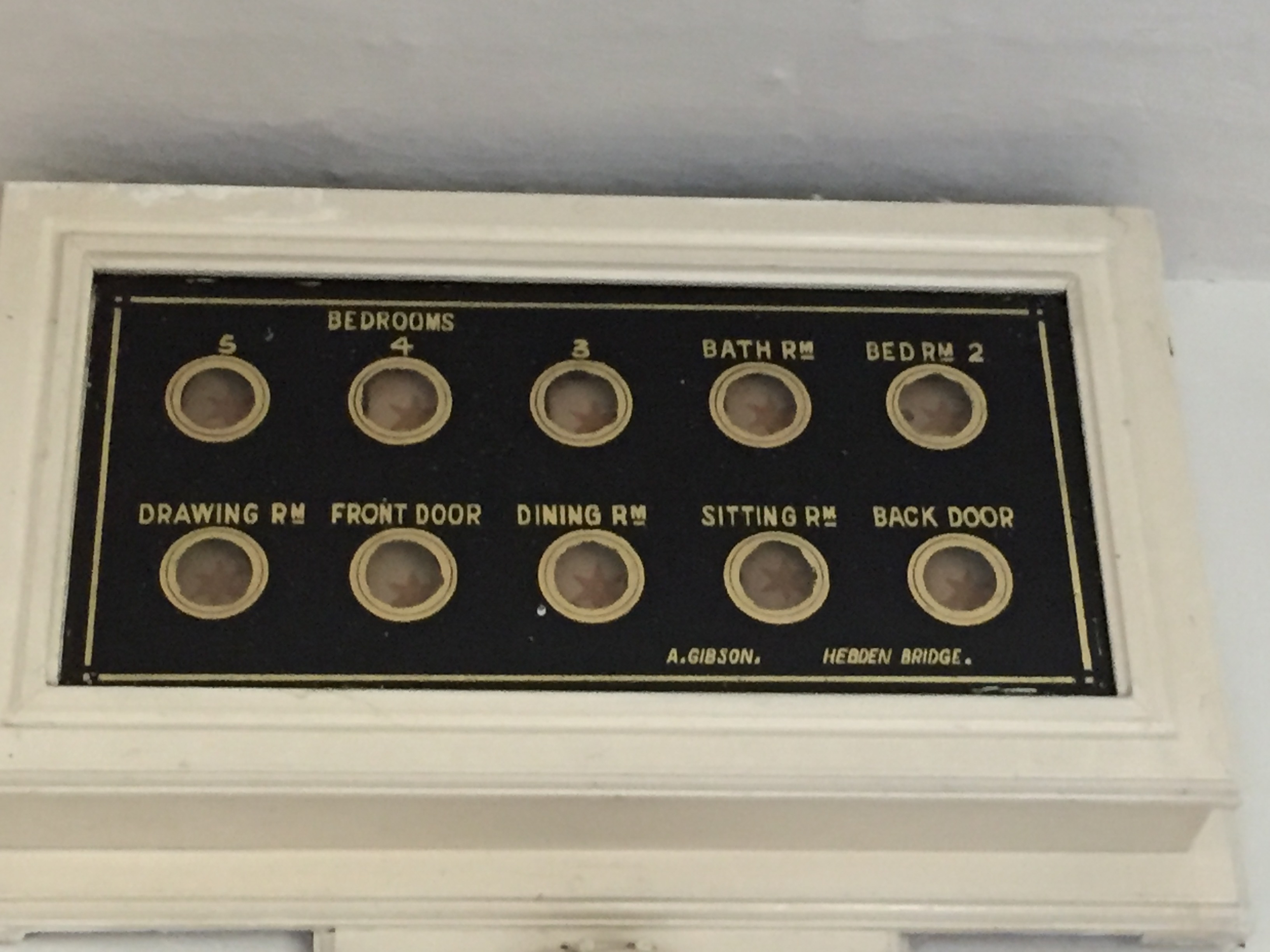
The current owner remembers when these servants’ bells were still in use. The last member of the Gibson family to own the house was Abraham Gibson who died in 1956. The house was offered to the National trust but they didn’t take it. The Trust did, however, taken on Gibson’s Mill, which is in the valley just below the house. it’s now a major tourist spot and I recall my mum talking about visiting it before she was married.
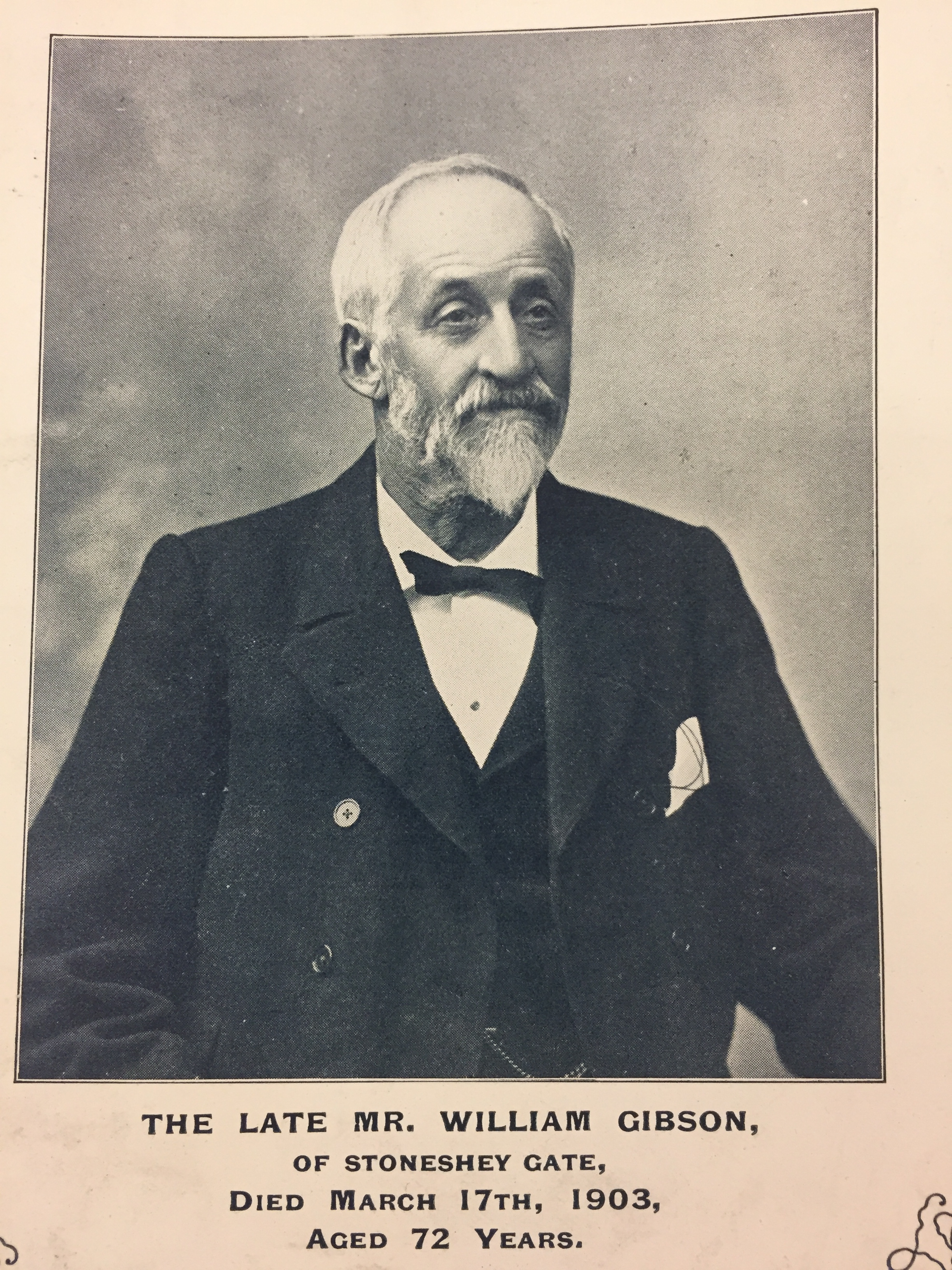

Beautiful gates inside the barn. The current owner has been raising baby peacocks and pheasants in here.

Debris in Croft House which has now been moved to the archives

The last Abraham Gibson (there were 5 generations of them). From the HM historical society

I found these in the archives. I visited Wainsgate chapel in 2017 – and had tea there!

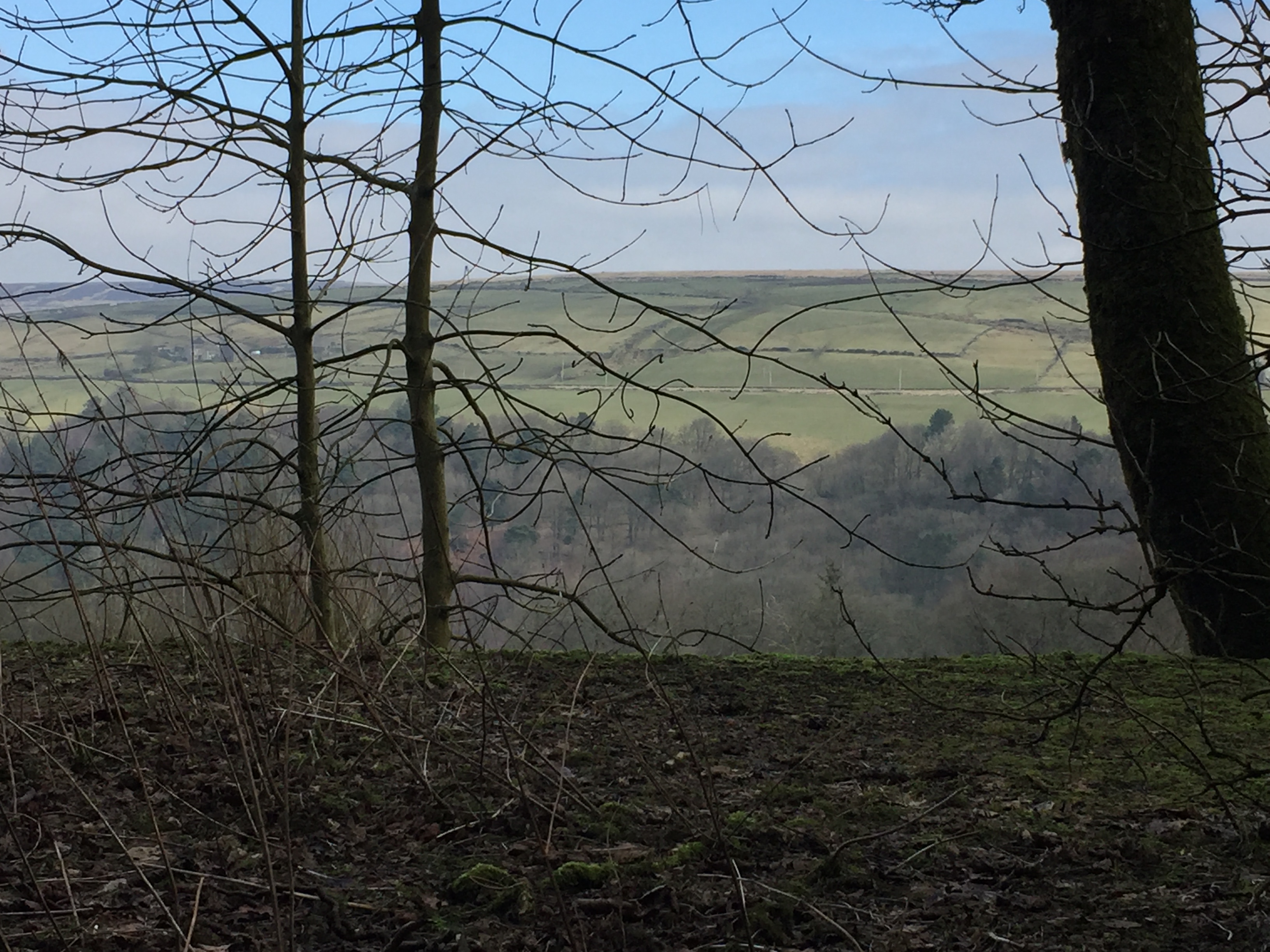
Gibson has a rotating viewing platform constructed overlooking Hardcastle Crags and Gibson Mill
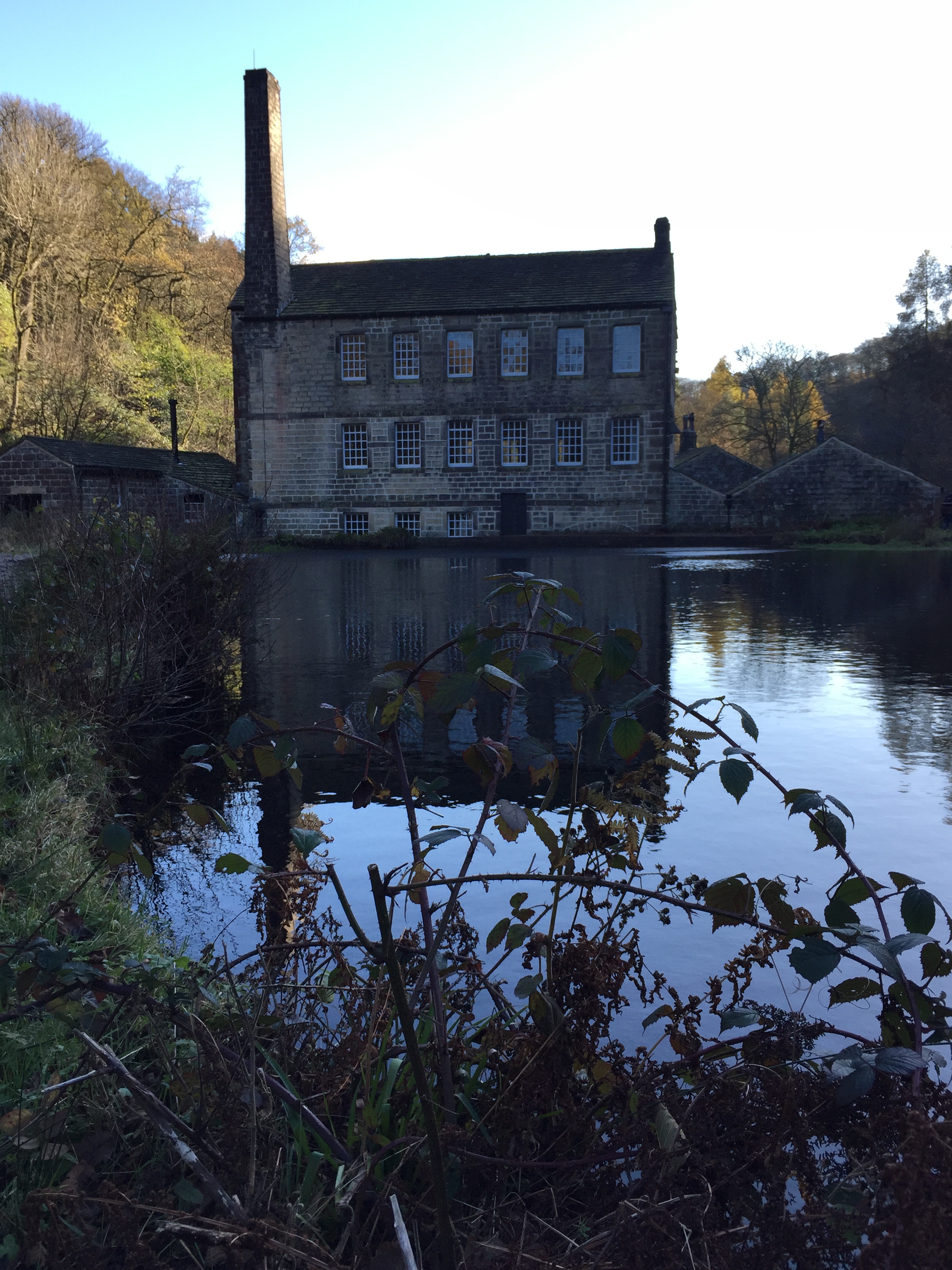
Gibson Mill today
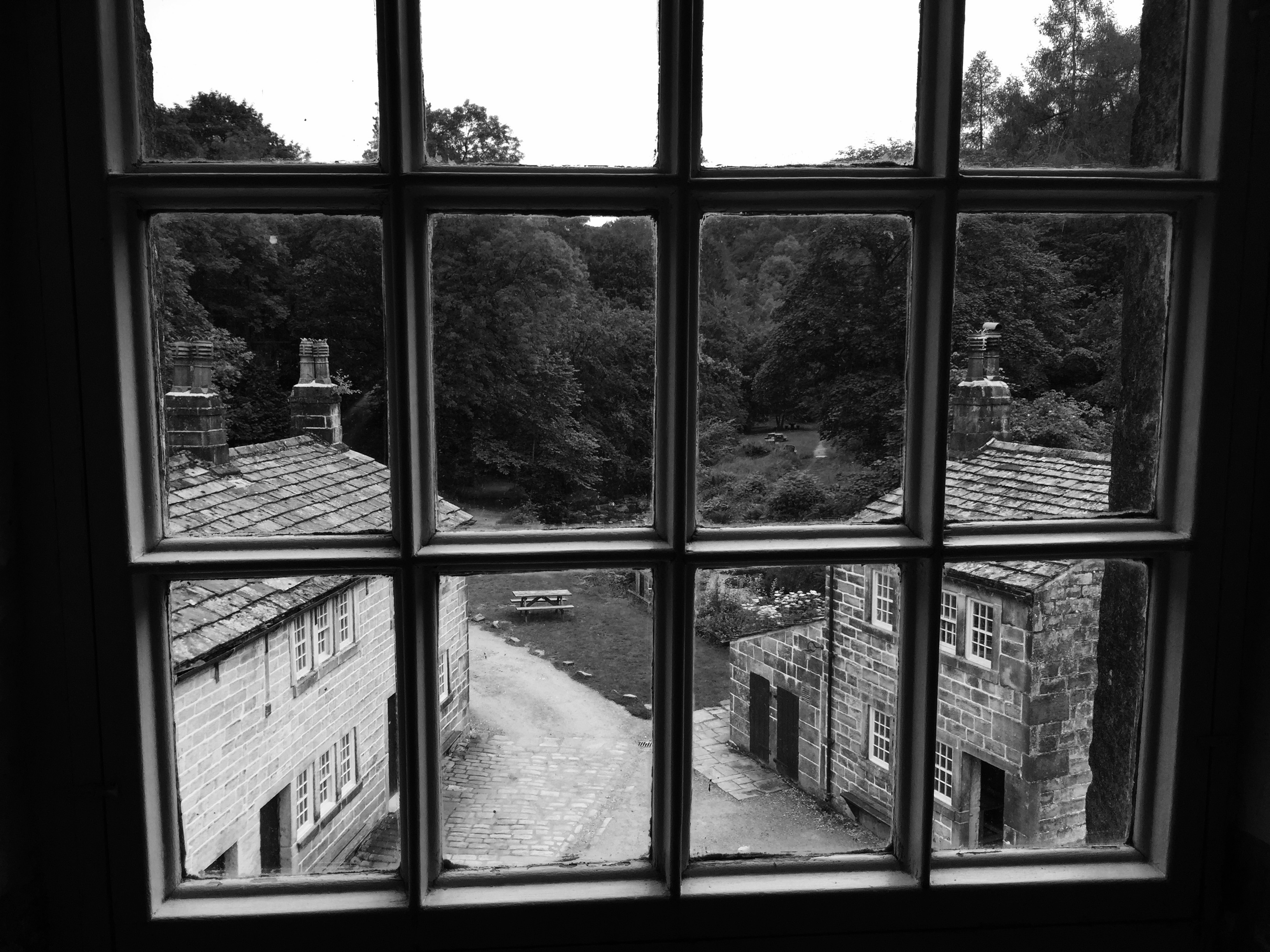
View from main mill buildsing

Anna playing dress up in Gibson Mill
I spent the afternoon sifting through a tiny proportion of the Gibson papers at the Hebden Bridge Historical society. I knew that the suitcases and boxes had been left in a building for 50 years and were destined for a bonfire when the building was sold in 2000. For photos of the building and the condition of the documents see:
http://www.hebdenbridgehistory.org.uk/gs/index.html
Abraham Gibson was a very wealthy Hebden Bridge man 1887-1956 who had owned many properties which he rented out to tenants – Lily Hall being one of them. He was also the owner of Gibson Mill, the picturesque mill in Hardcastle Crags and it was he who donated it to the National Trust. I found a map of the mill in 1847 when it was owned by Abraham’s father, Abraham! (1827-1807) Then I found this article in the newspaper:
Leeds Times – Saturday 02 April 1898
The body of Dawson Greenwood, a young married man, who resides at Lily Hall, Heptonstall. was I taken out of a reservoir in the Hardcastle Crags Valley on Friday. Greenwood had been missing from home for several days.
Drowned himself in Keypit Holm dam. Temporarily insane – West Yorkshire deaths.
What a tragic link between the owner of Lily Hall, and the tenant.
I was shown a video of the room in which the documents were discovered – and . . . lo and behold it was in the building where I’d gone to view the first apartment that I took a look at in Hebden Bridge.
Croft Terrace, Hebden BridgeA terrace of 4 houses built around 1855 by James Lister [1817-1887] Son of George Lister, timber merchant. He was a timber merchant [1838] / a timber merchant and quarry owner at Hebden Bridge [1851]He had business at Hebden Wharf.Croft House was Number 4, Croft Terrace.Owners and tenants of other houses in the Terrace have included Hebden Bridge Nursing Institute [1897], Thomas Binney Gibson, (my first cousin four times removed!) Edward Binney Gibson, (my second cousin three times removed!) and Miss Corrie’s School [1950s]. In the 1970s, the houses became the Hebden Lodge Hotel
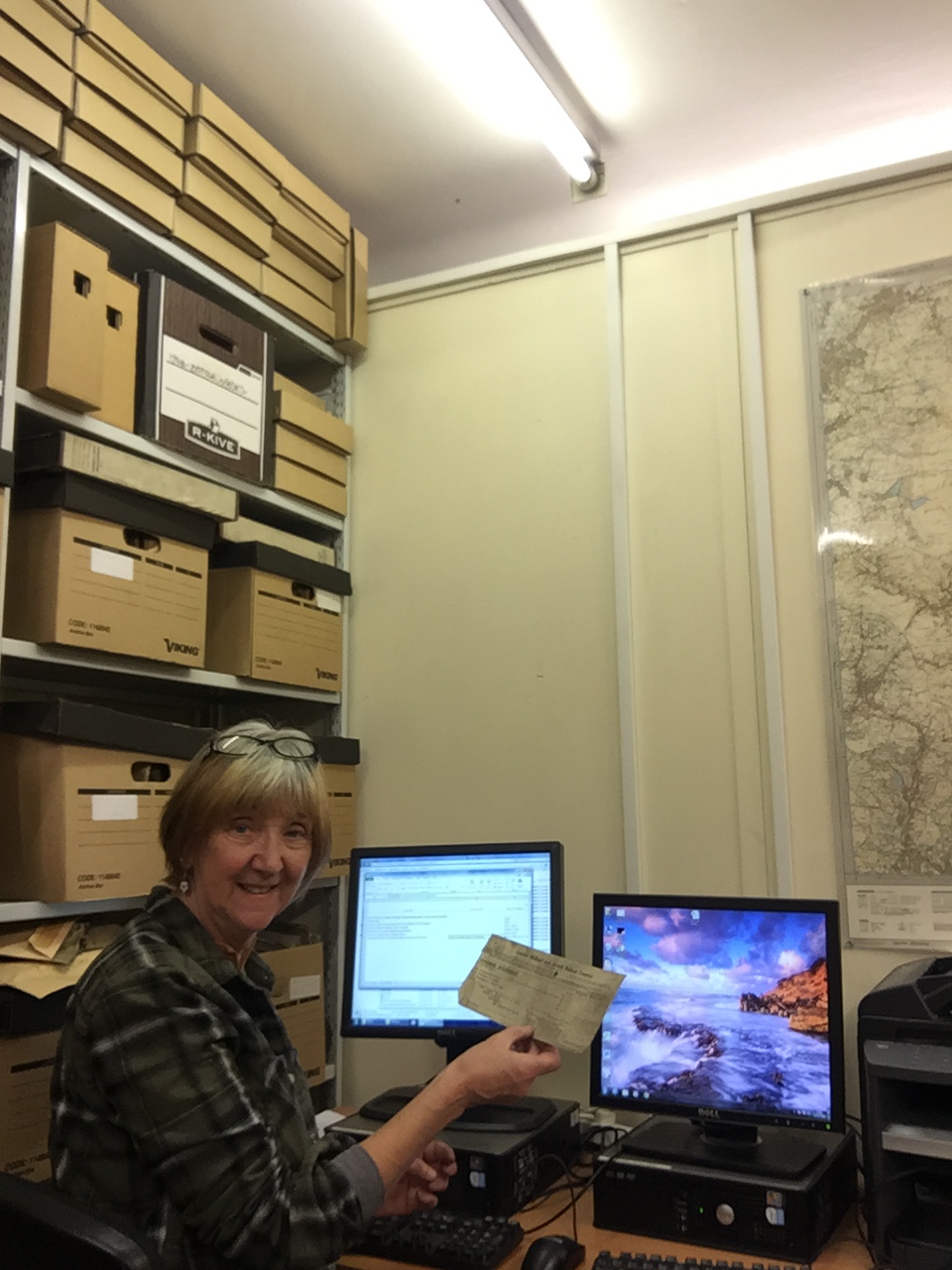
The boxes on the shelves are just a portion of the Gibson documents that need cataloguing!

Dust and water have taken their toll on the papers
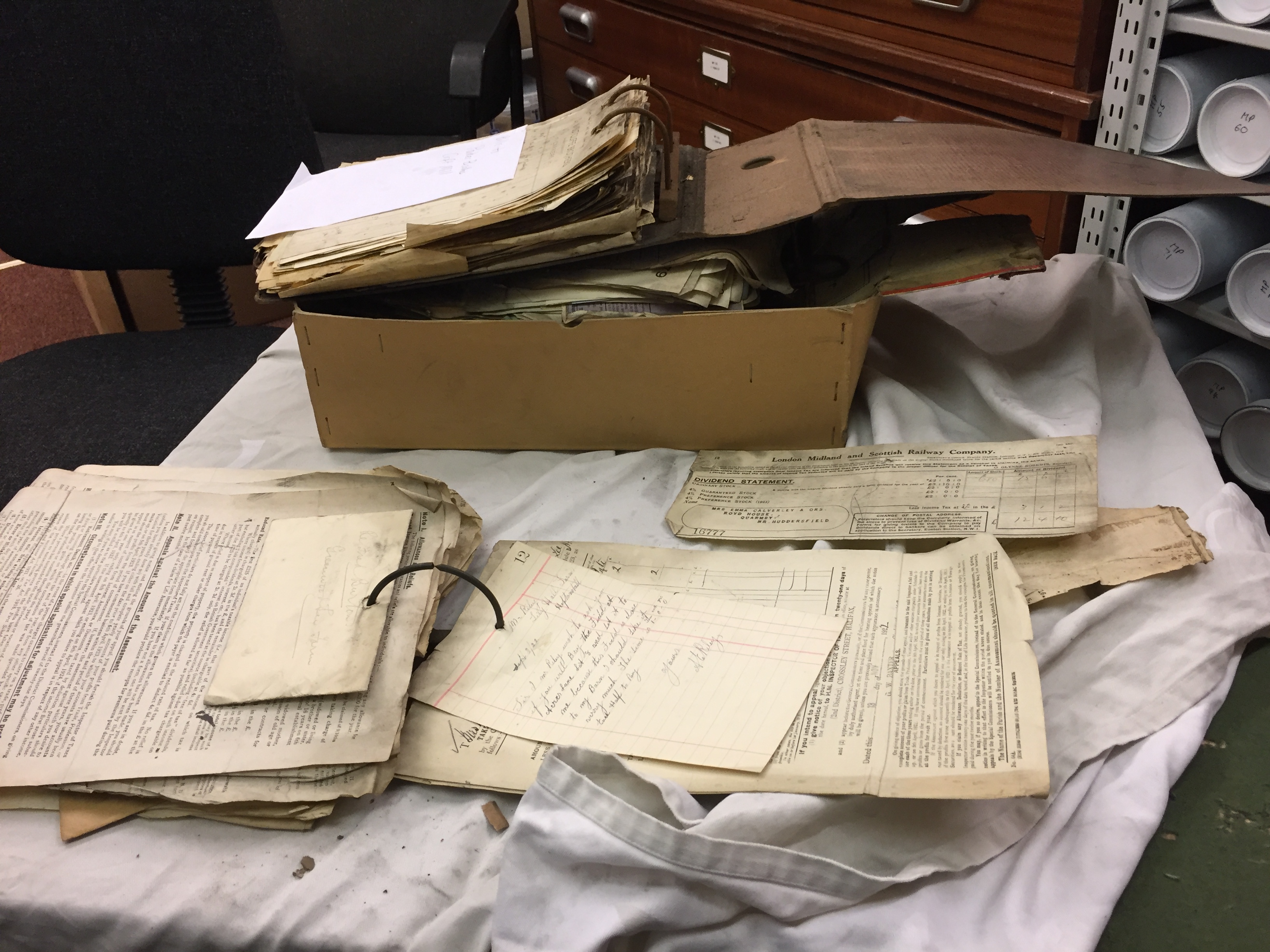
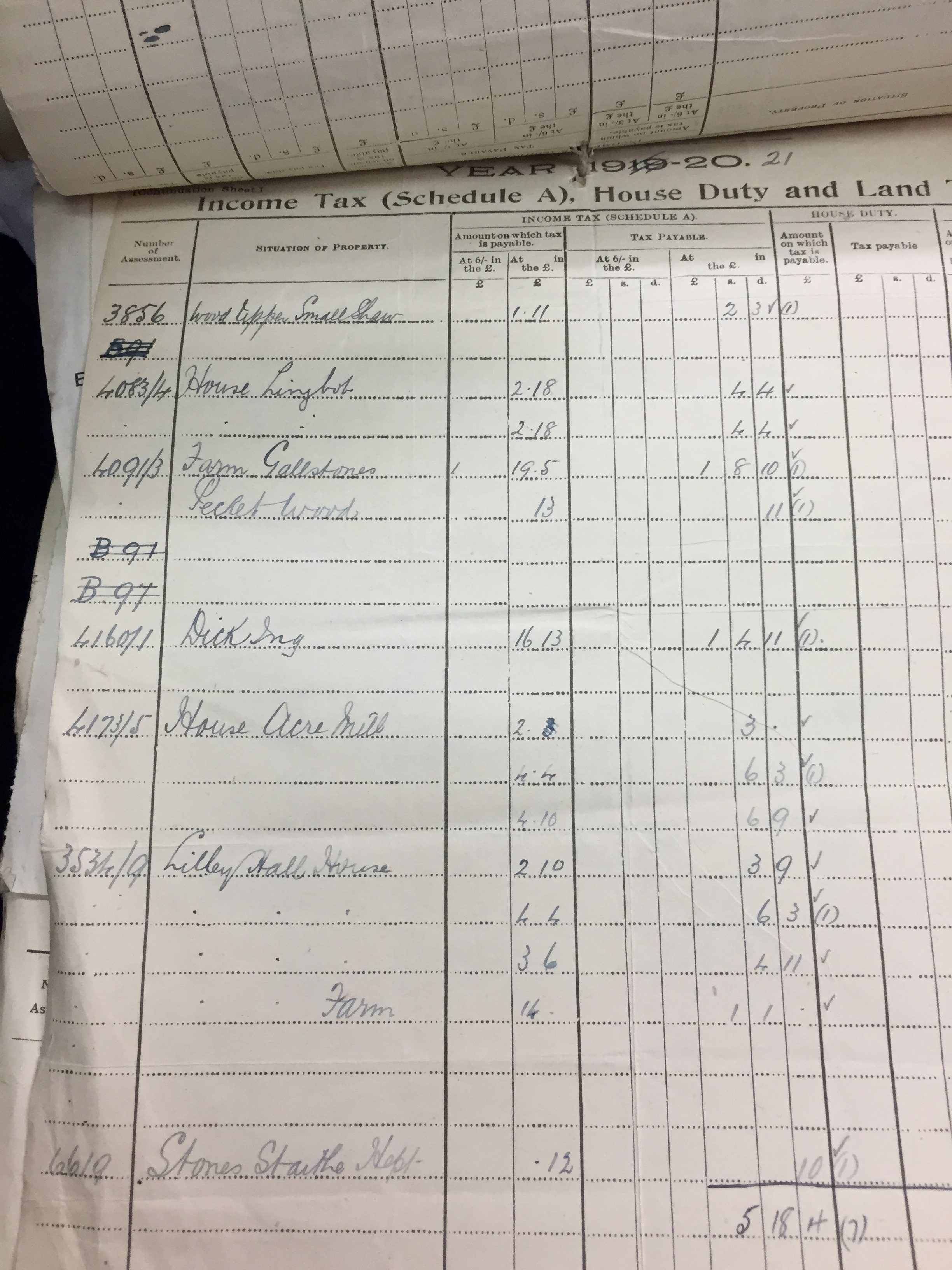
Document from 1920 showing a portion of the houses that Gibson owned. Lilley Hall is clearly divided into ‘House’ and ‘Farm. ‘ And quite by accident when I’d taken my walk from Pecket Well that very morning I had passed several of these properties.
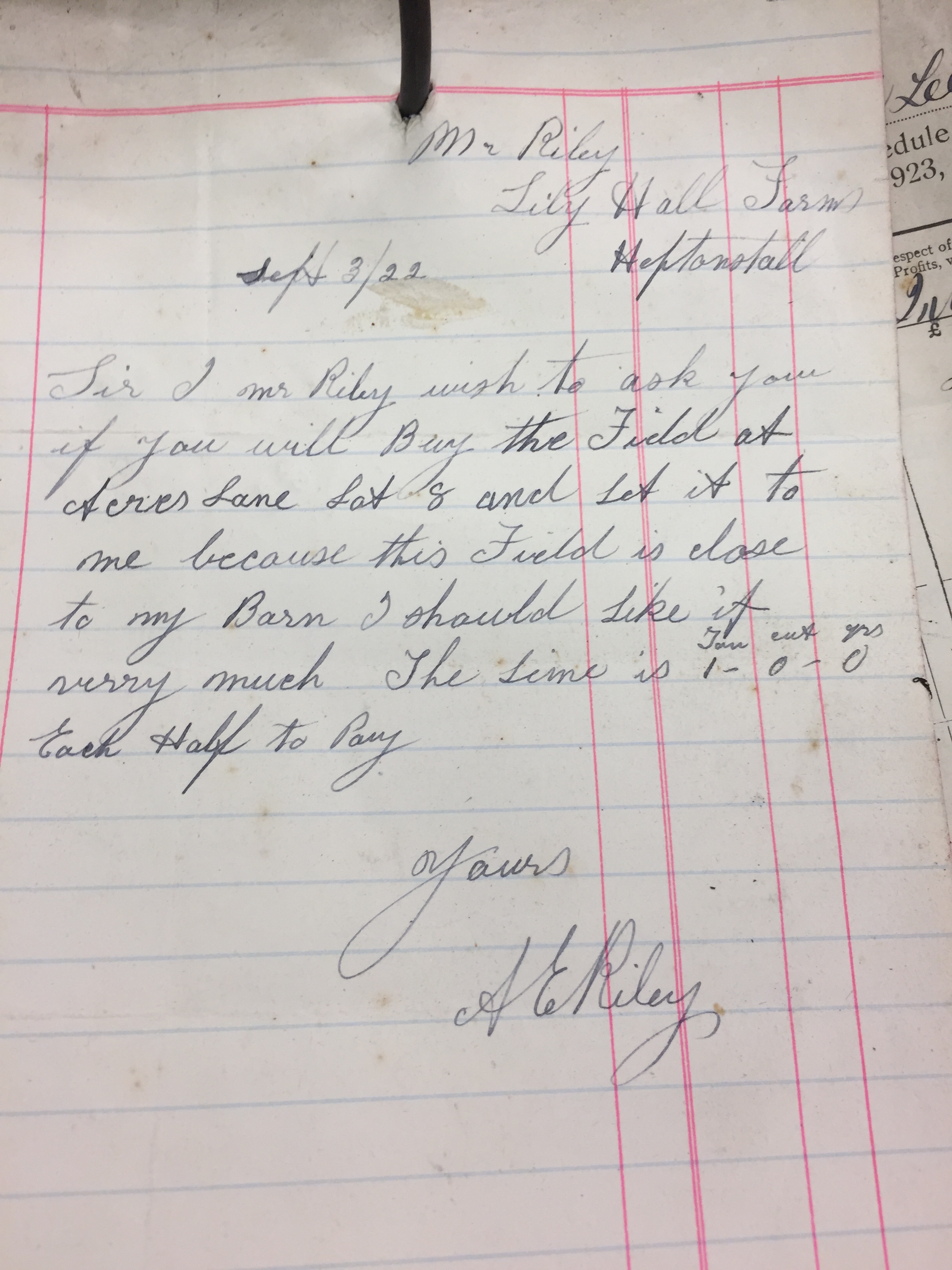
A Mr A. E Riley was living at Lily Hall farm in 1922, and is obviously a farmer.
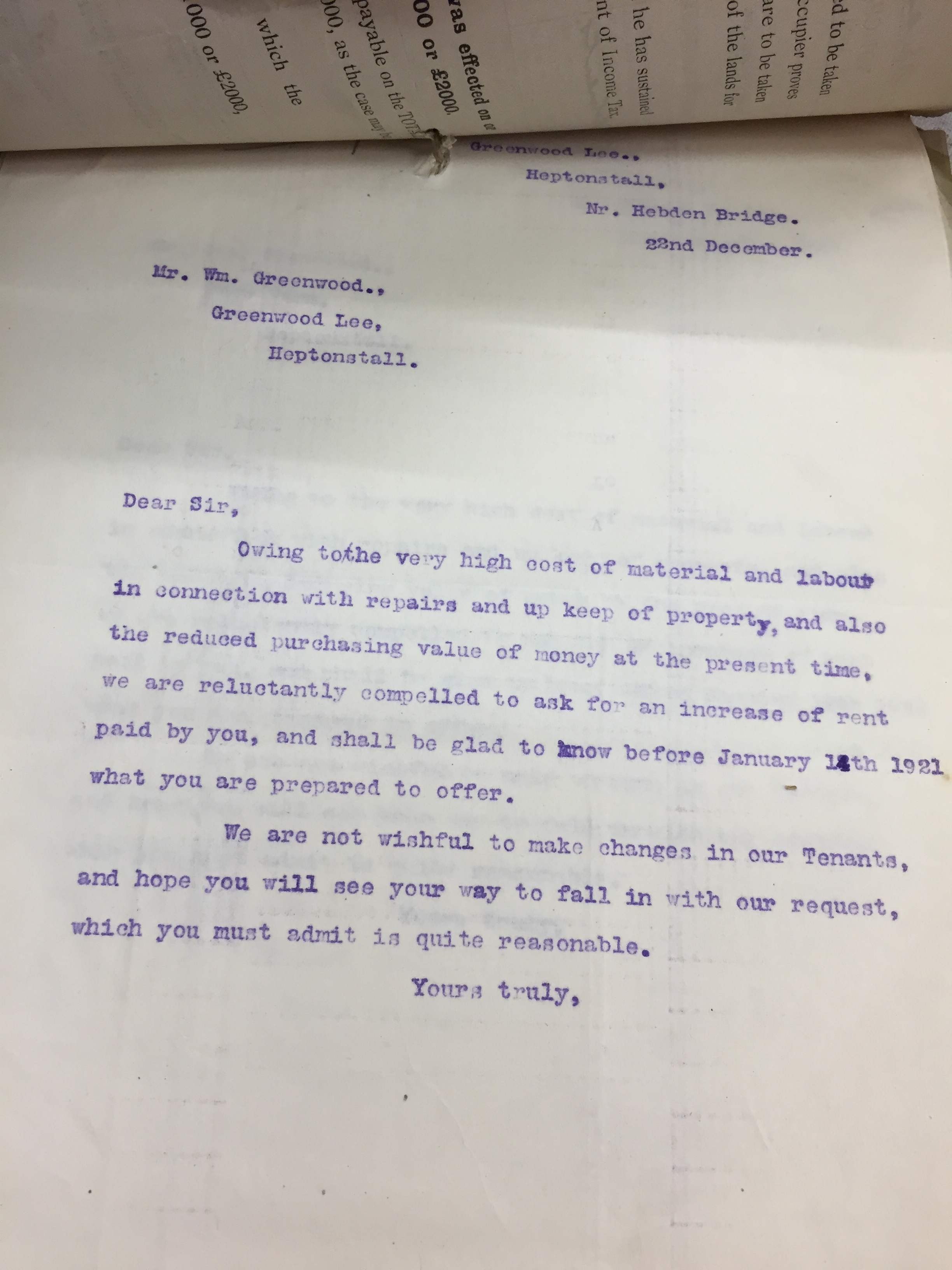
A notice send by Greenwood to all his tenants notifying them of an increase in rent, in1922
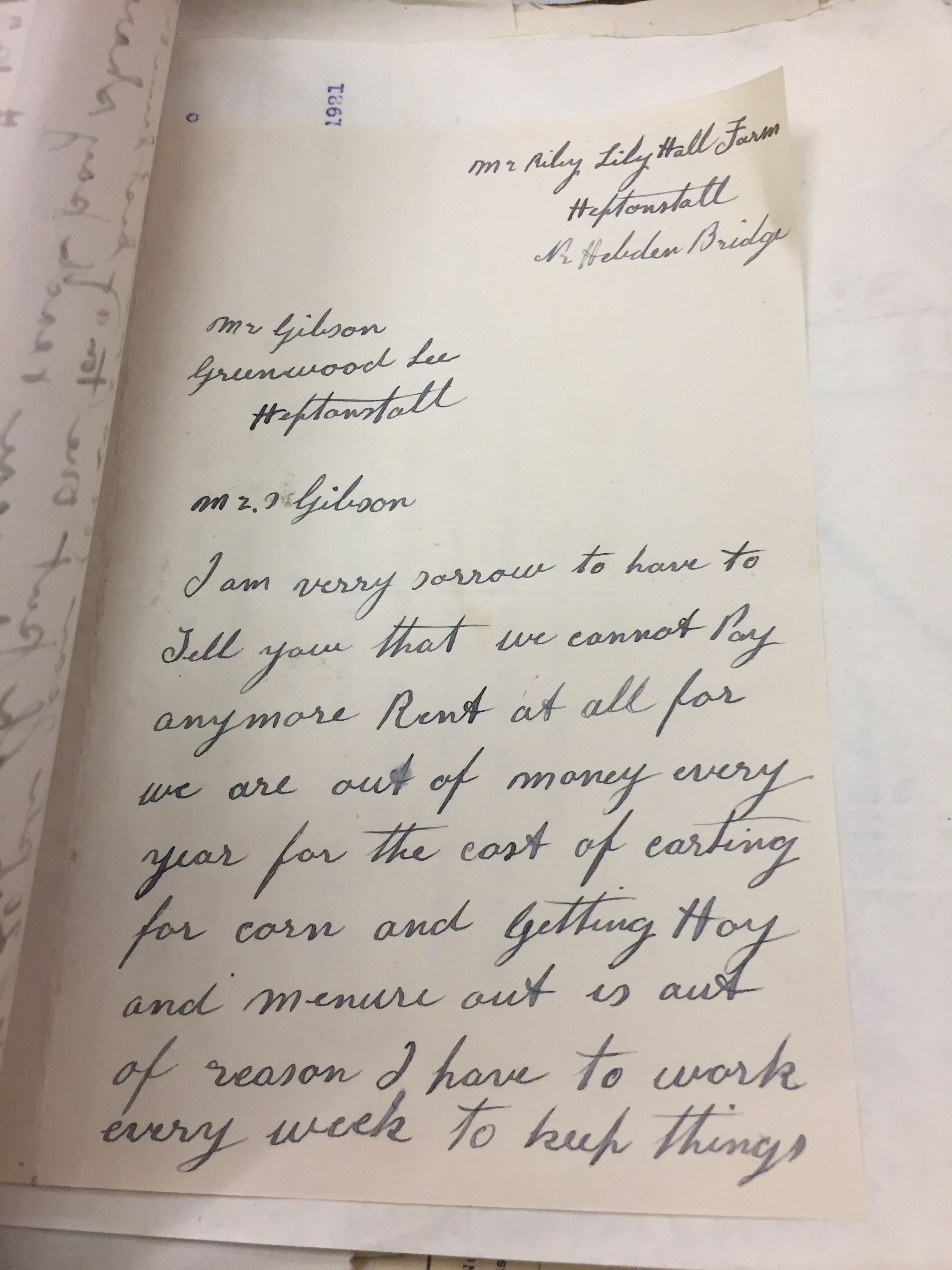
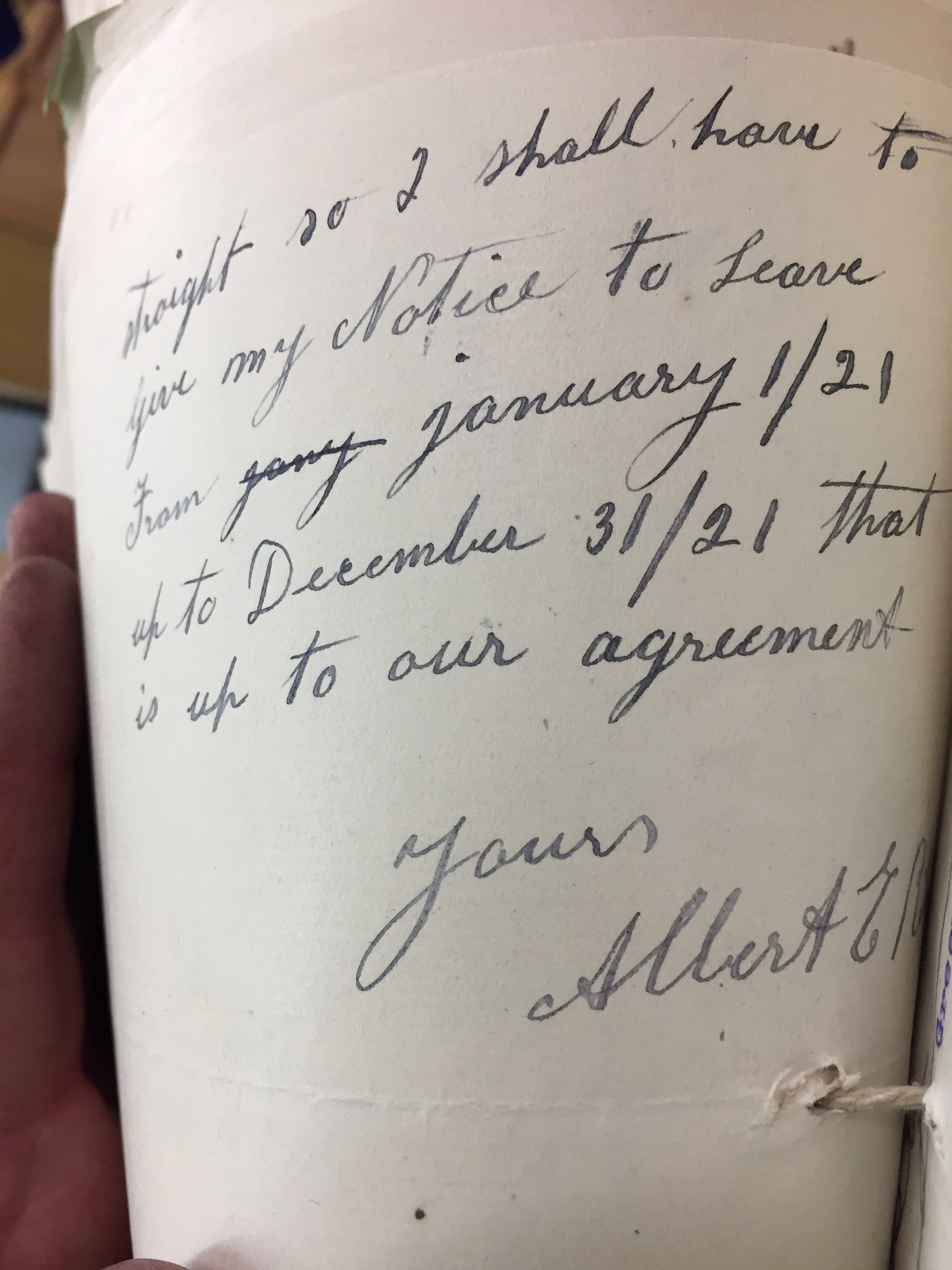
The response by Albert E Riley saying that he can’t afford the increase in rent and will therefore be vacating Lily Hall. I looked up Albert Riley and he was from Southowram, and was baptised at St Anne’s in the Grove, Southowram, where Rachel and I once spent a lovely afternoon with the vicar.
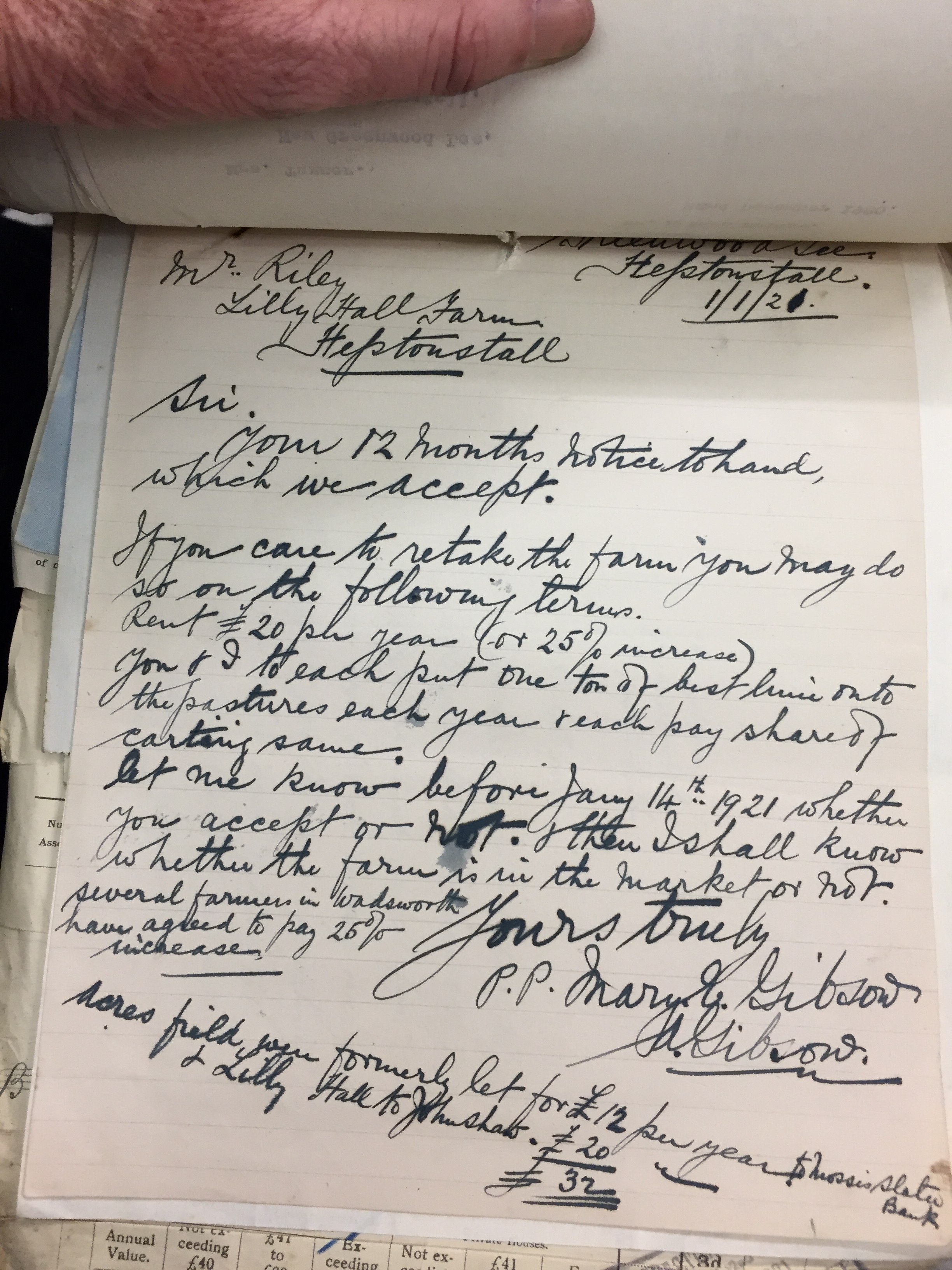
Gibson’s counter proposal

the Mashonaland Railway Company, Zimbabwe, 1927 . . .
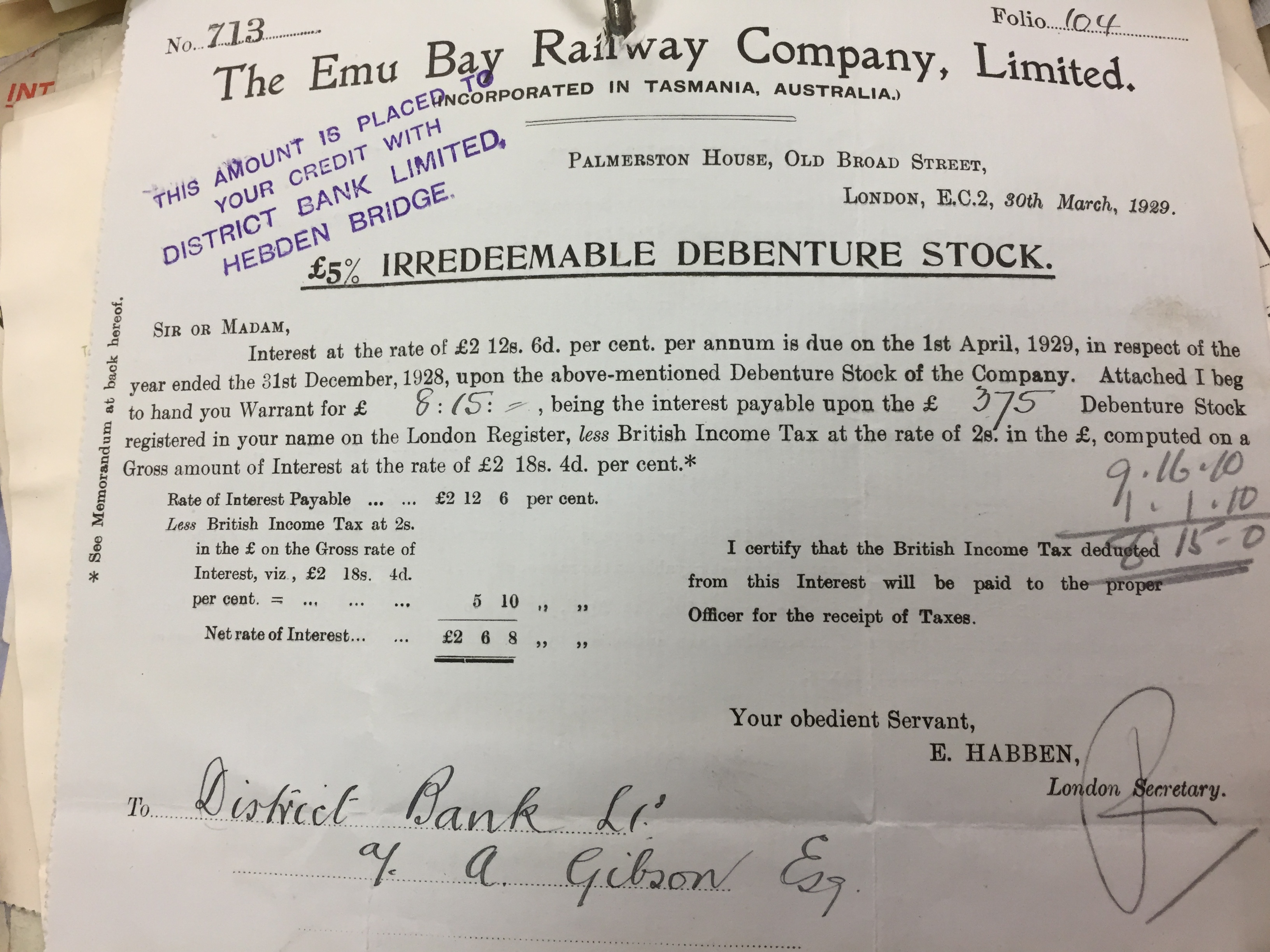
and the Emu Bay Railway Company, Tasmania in I929
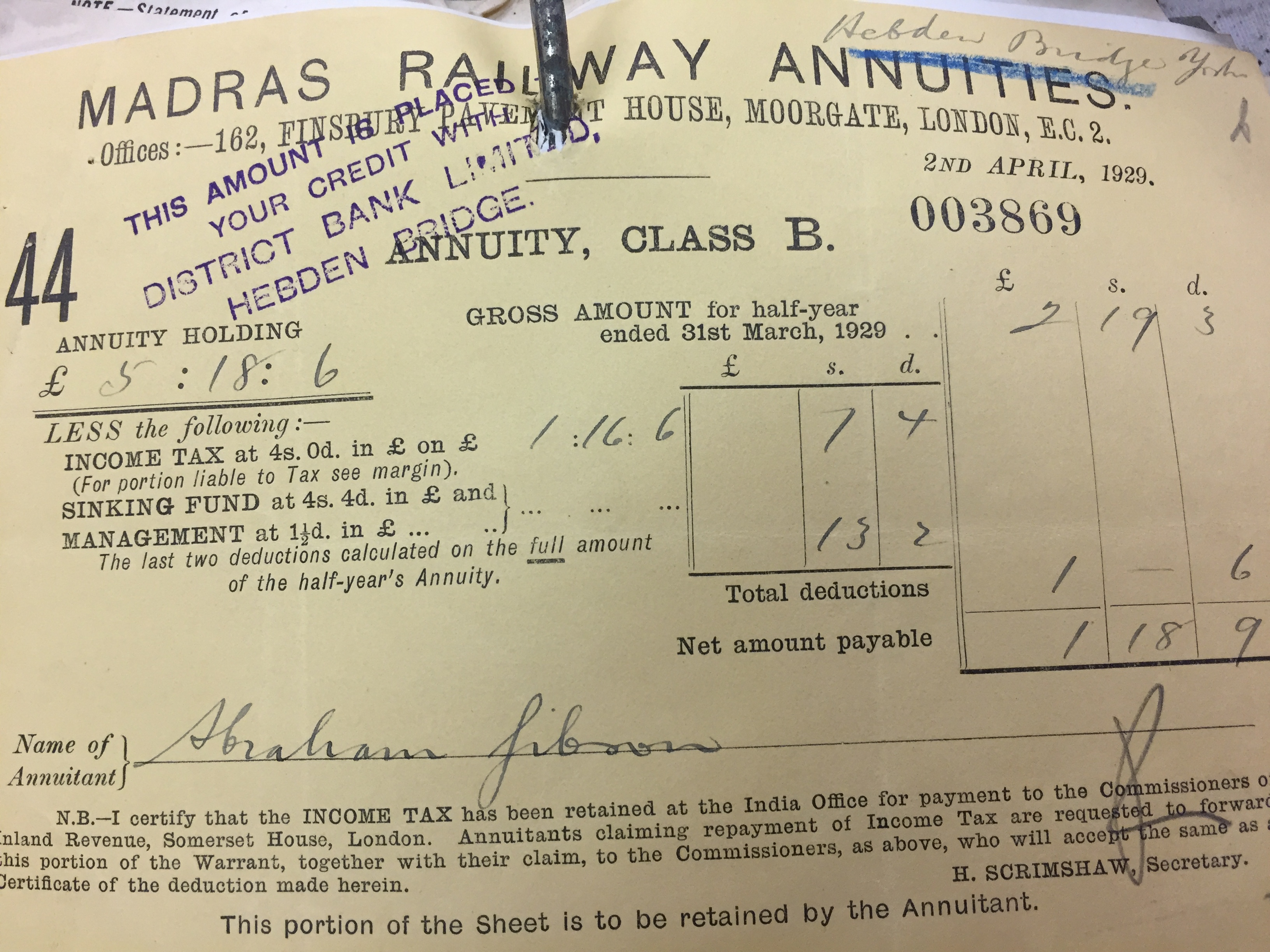
. . . and the Madras railway Company, India.
So I spent yesterday afternoon at Hebden Bridge Archives. My goal was to find any references to Lily Hall, and to find out anything about Mr John Cousins who owned the hall in 1837. He was also joint owner of Mitchel Brothers Mill in Old Town, the little village high above Hebden bridge which, unlike Hebden, was mentioned in the Domesday Book. There were two experts on hand to help me in my search, and it was so much fun digging around in boxes of uncatalogued documents – Ok. What a nerd! I even found myself volunteering to go back for a three hour stint tomorrow to help document the documents! It turns out that this wall of boxes of barely catalogued documents were actually scheduled to be burned in a big bonfire in 2000, when a house was being sold, and the old owners had to clear out everything before the new people took possession. hebden Bridge historical society got word of the issue and stepped in and took the thousands of documents which had not been touch for 50 years into their library. Of course, in my search for Lily Hall related papers (several of which I found) I got diverted. I even found an acceptance of a proposal of marriage, as well as papers that would take hours to decipher, from the late 1600’s. One of the experts was looking online for a wonderful website that has been down since Christmas because of security issues. It is called Malcolm Bull’s Calderdale companion and it’s an amazing resource, which I’ve made some contribution to as I further my own research. However, as he typed in ‘Calderdale Companion’ the screen filled with photos of ‘Asian girls, just for you in Hebden Bridge’ and ‘Russian ladies are waiting for it in Hebden Bridge.’ We burst out laughing which brought a swift response from the other researchers who laughed along with us and commented, ‘You’re having too much fun!’ We’d barely got back to our online search when we were disturbed by a lady nailing picture hooks into the wall in the corridor outside the library. “Too much banging out there” called my expert. It took a minute for the penny to drop before the whole library erupted in fits of laughter.
My quilt project is coming along. I’ve just spent a couple of days assembling the three layers which is my least favourite part of the project. Now comes the hand quilting part.
I found this reference to Lily Hall in a 1898 newspaper:
Leeds Times – Saturday 02 April 1898
The body of Dawson Greenwood, a young married man, who resides at Lily Hall, Heptonstall. was taken out of a reservoir in the Hardcastle Crags Valley on Friday. Greenwood had been missing from home for several days.
Drowned himself in keypit Holm Dam. Temporarily insane – West Yorkshire deaths.

I found this map of where the tragedy occurred. Sarah and Anna have been to this Mill dam at Hardcastle Crags. With Anna I walked down to it from Heptonstall.

Record of repairs to Lily Hall

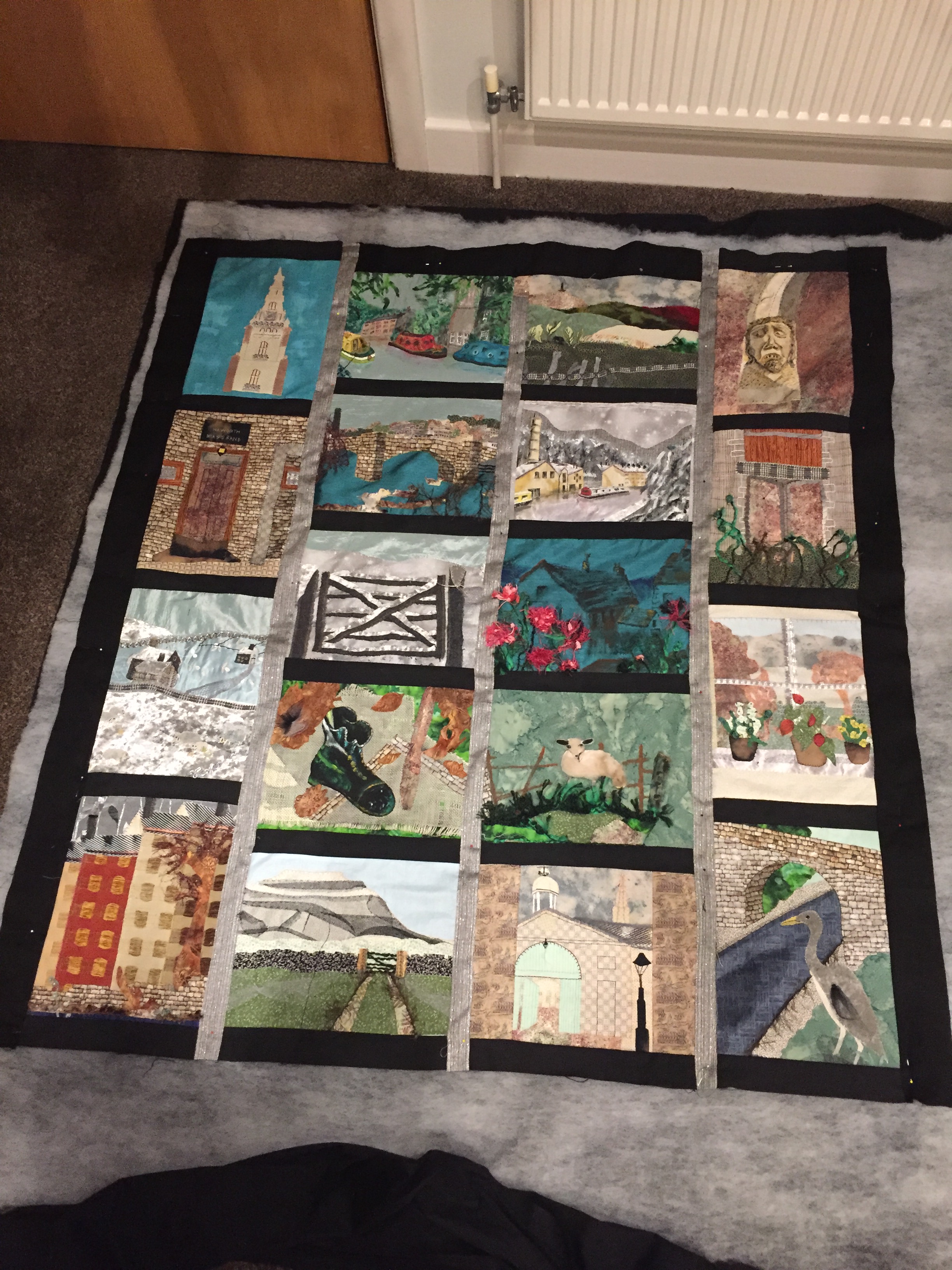
The assembled quilt
In the summer of 2016 when I was staying in Hebden Bridge my eye was constantly drawn to an imposing building on the North side of the river. I could see it from where I was staying and so finally one day I decided to find my way to see it up close. This is what I wrote in my blog about that day: ‘So a day without plans . . . From my room I could see an imposing old hall across the valley, a little higher than my building so, around 11 a.m. (a lazy morning writing up my blog) I headed up New Road which climbed steeply until I came to the hall. Despite the intermittent downpours there was an amazing view from this elevated position and I could just seen the window of my room peeking out between the trees.’ Yesterday afternoon I was kicking my heels at home. Amazon had promised to deliver my new mattress topper on Tuesday and I’d basically not left the house as I waited its arrival apart from a quick trip to buy milk on Wednesday afternoon. Now it was Thursday and it had just arrived – yeah! Still feeling lethargic I browsed around my ancestry research and came across a reference to Weasel Hall. Abraham Crabtree, the paternal grandfather of the husband of my 3rd cousin 2x removed (!!!) had lived at that address from 1871-1891. I suddenly recalled that the old hall I’d walked up to was close to a railway tunnel called Weasel Tunnel. In fact I’d taken a photo of the sign because, in error, Hebden had been spelt Hebron. So, just as the sun was setting, i.e. 3:30 p.m. I set off to see if the hall could possibly be Weasel hall.
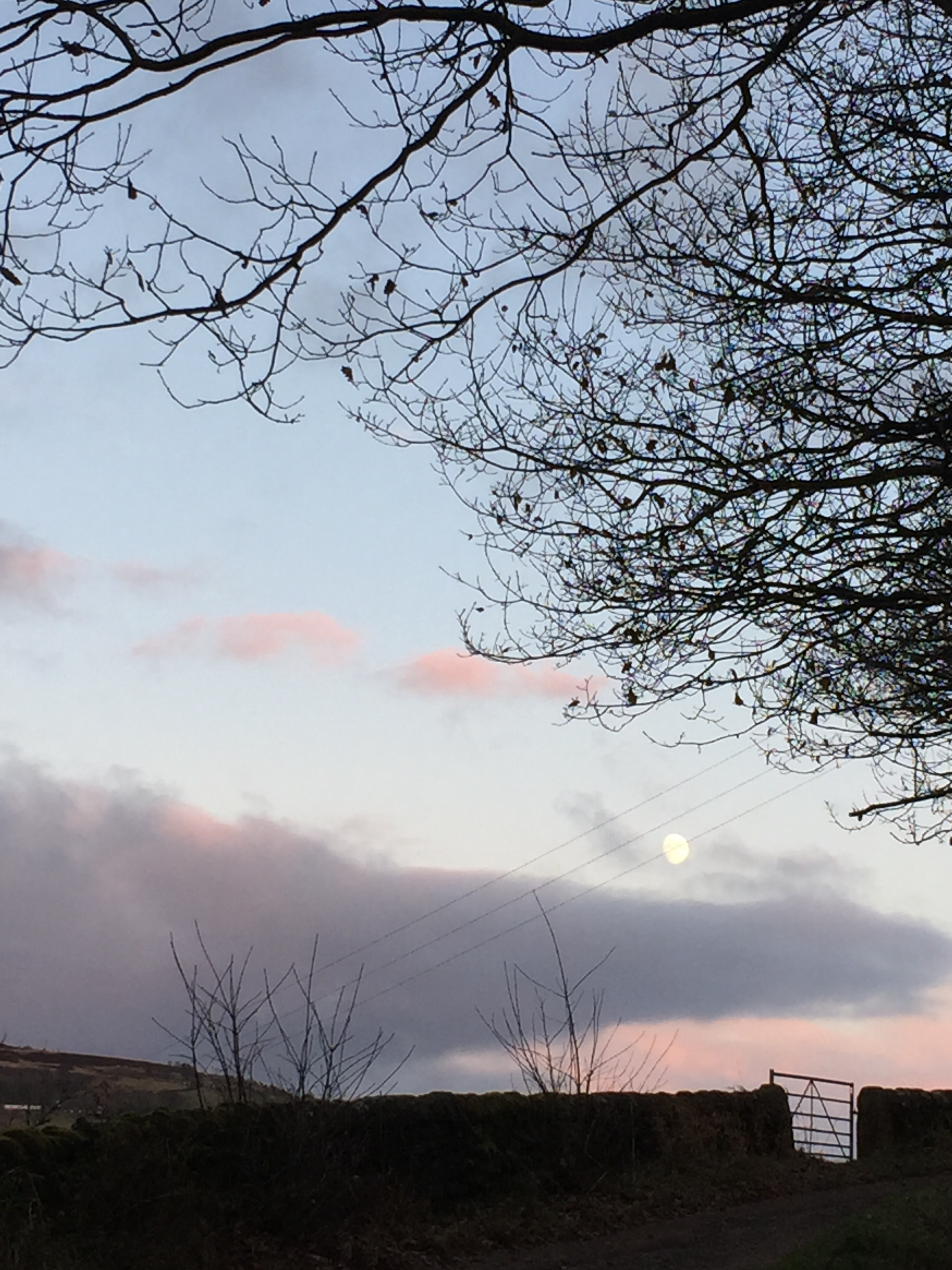
3:30 in the afternoon and the moon is up!
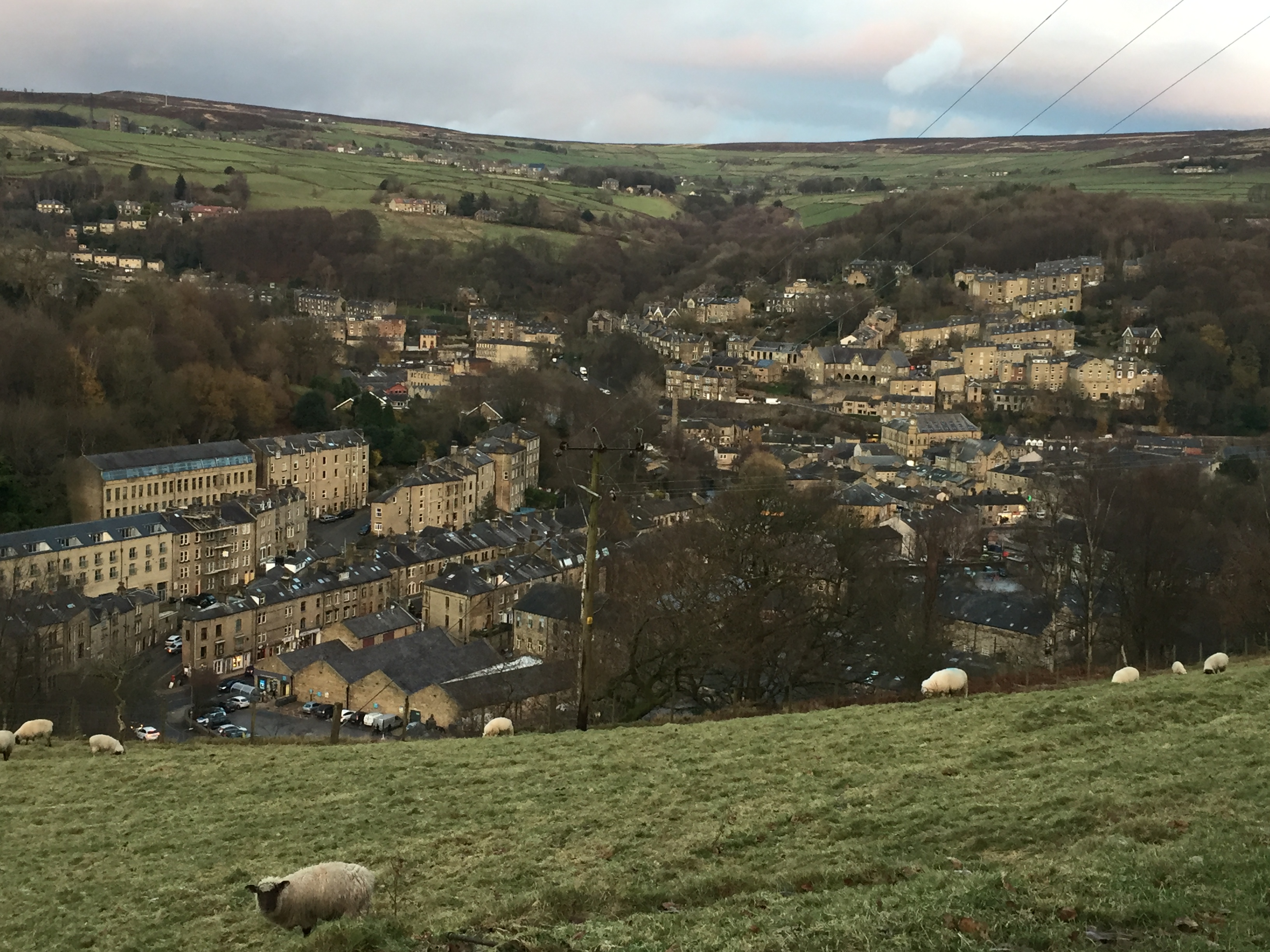
View of Hebden Bridge from Weasel Hall
Unlike last year when I just took photos of the views of the valley from the hall I wanted to know more so I knocked on the door. “You don’t know me but my ancestors used to live here several generations ago,” was my conversation starter. Within minutes I’d found that the current owner had been a pizza delivery man in Bolton (where I grew up). I’d found out online that the present Weasel Hall only dates from around 1840: “Constructed by the Manchester and Leeds Railway Co. c.1840 to replace Weasel Hall which was demolished in the construction of the railway line. Hammer-dressed stone, stone slate roof. 2 storeys. 3 cells each.” The current owner suggests that the ornate chimneys may have been salvaged from the earlier hall because they seem far too grand for a simple country hall. He’s lived there for 12 years and when I asked him who had renovated the place he mentioned a man called Barker who currently lives in a renovated farm near Stoodley Pike – with no road access. I wondered if it was one of those lovely farms Sarah and I had passed on our way down from Stoodley Pike in the summer. The more I looked at Weasel Hall from different angles the more it reminded me of Lily Hall. In fact Lily Hall is directly across the valley from here, perched precariously on a steep hillside. The proportions of the buildings are almost the same. I seemed to recall Anne telling me that Mr Barker renovated Lily Hall. I checked up, and sure enough, the same person appears to have renovated both buildings around the same time. Wow! 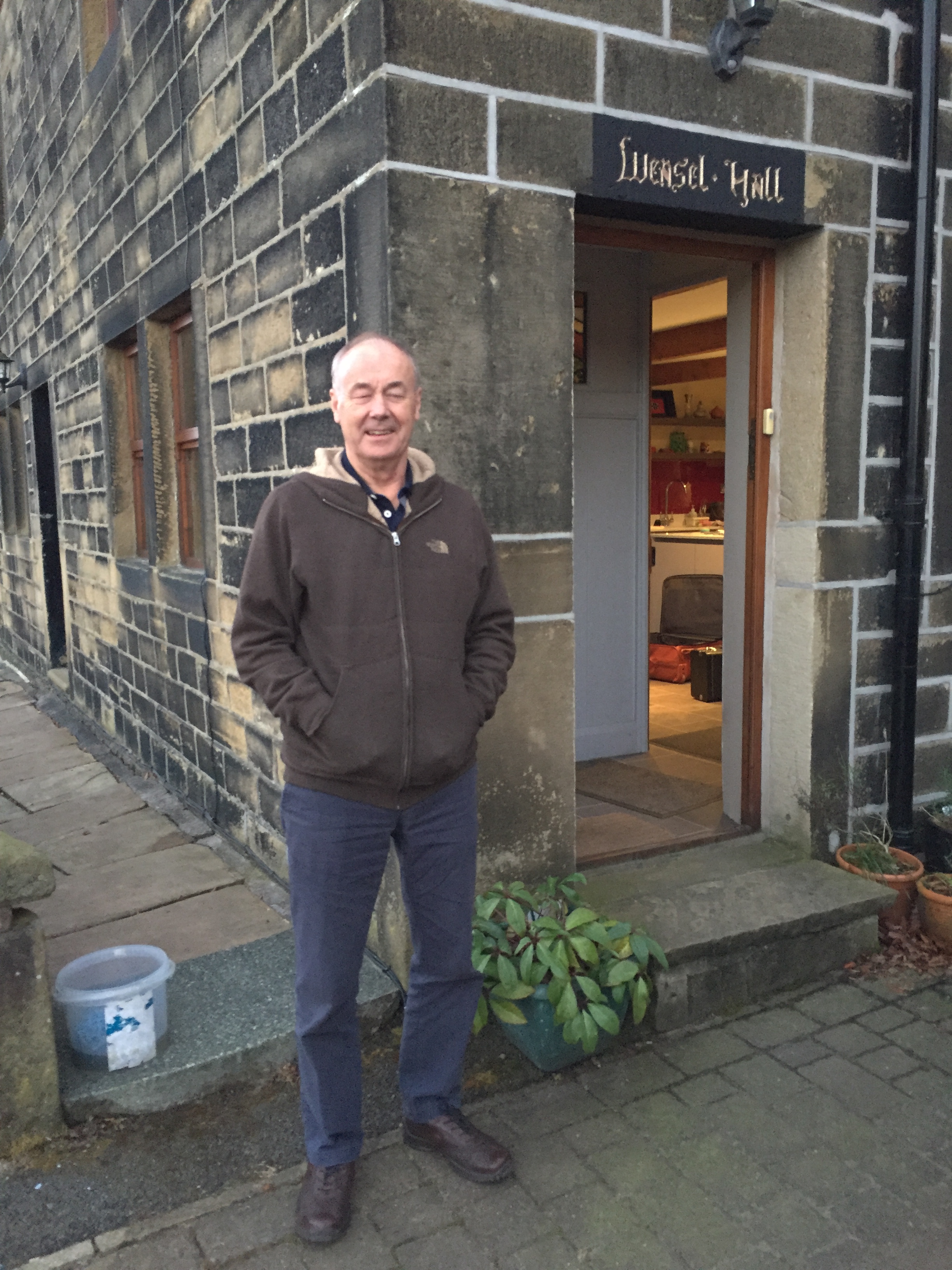
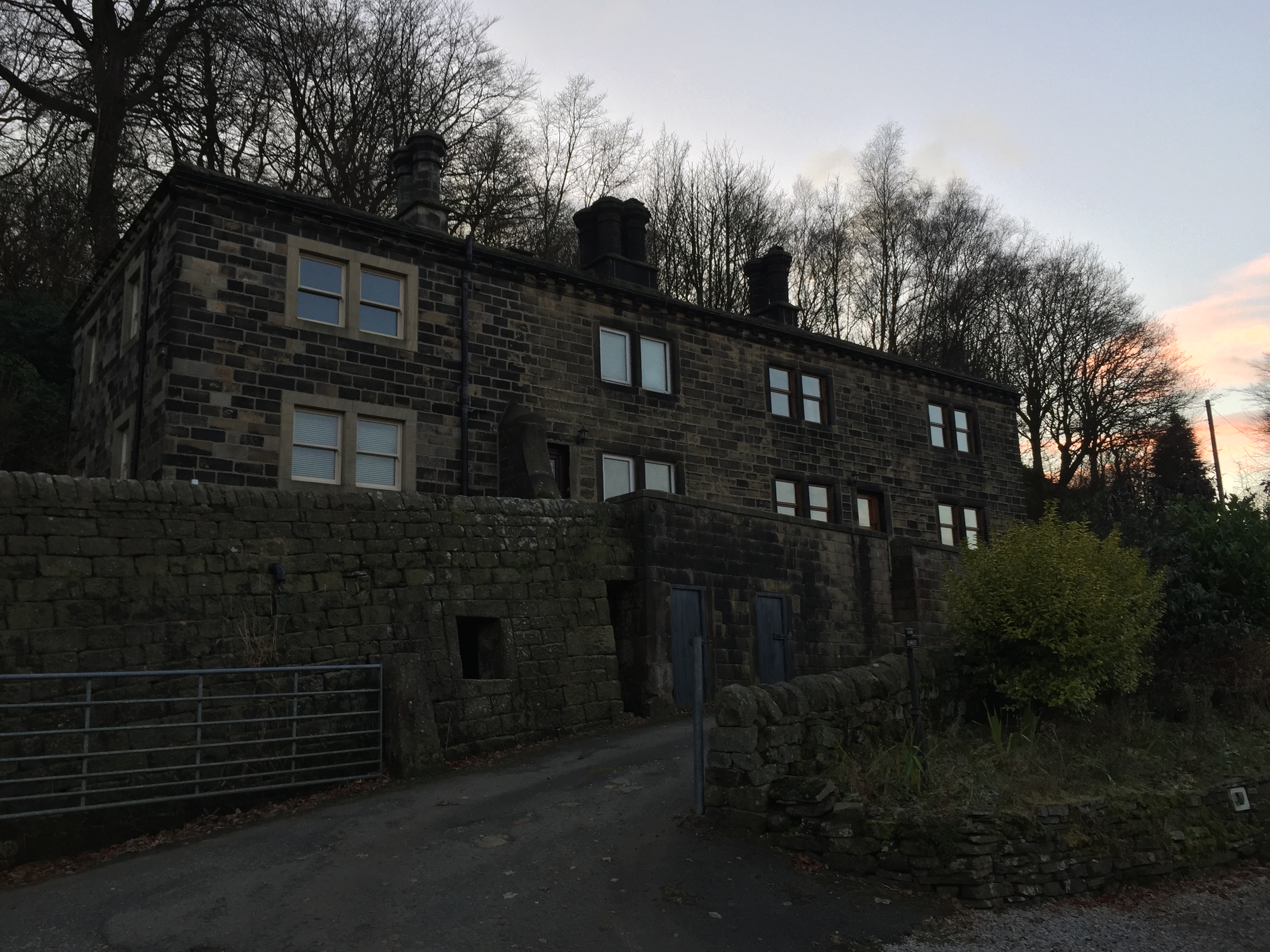
Weasel Hall looks very much like Lily Hall
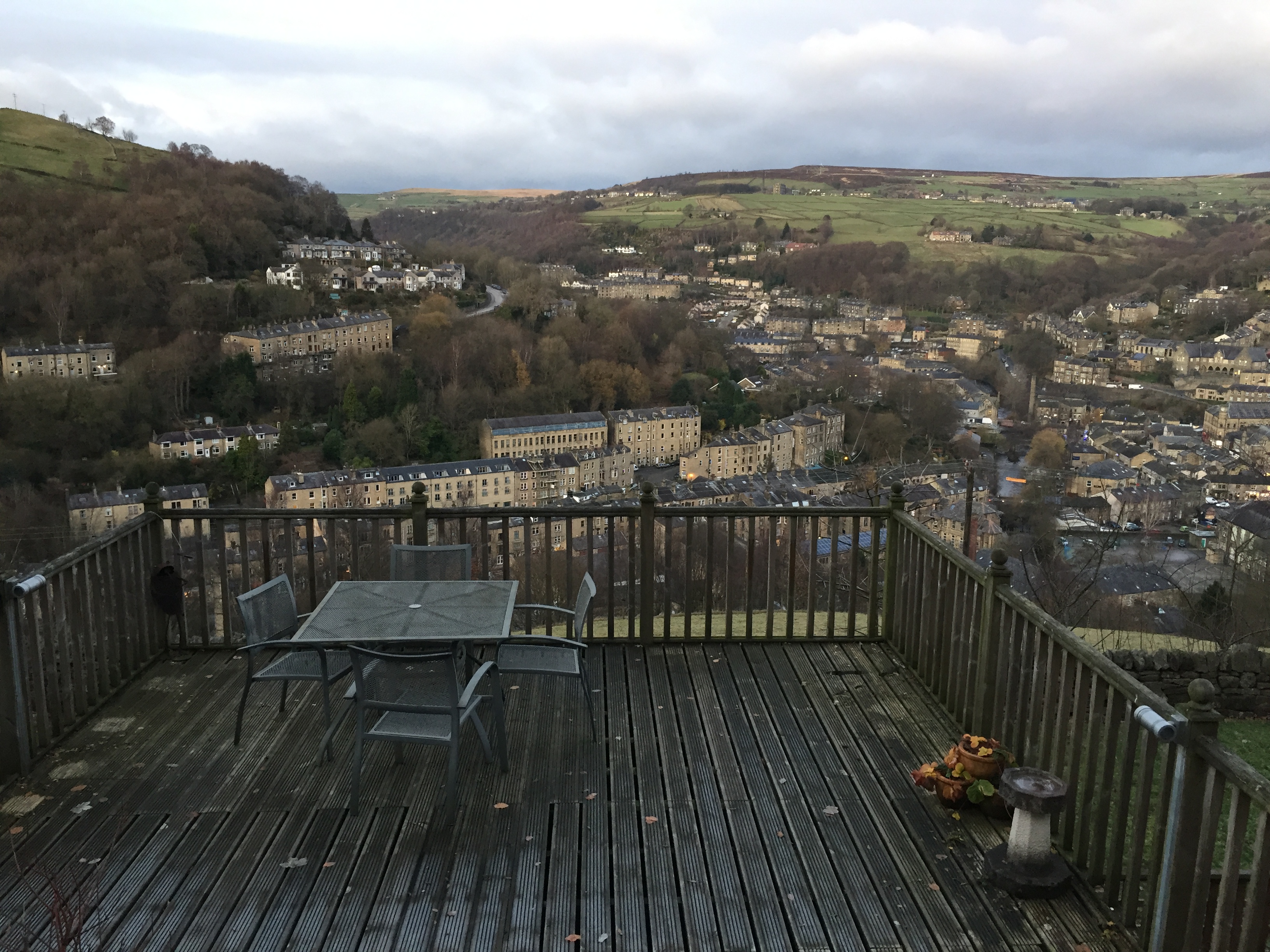
View from Weasel Hall’s deck. I could make out my apartment and the church where I have the rehearsal for the carol service tomorrow night.
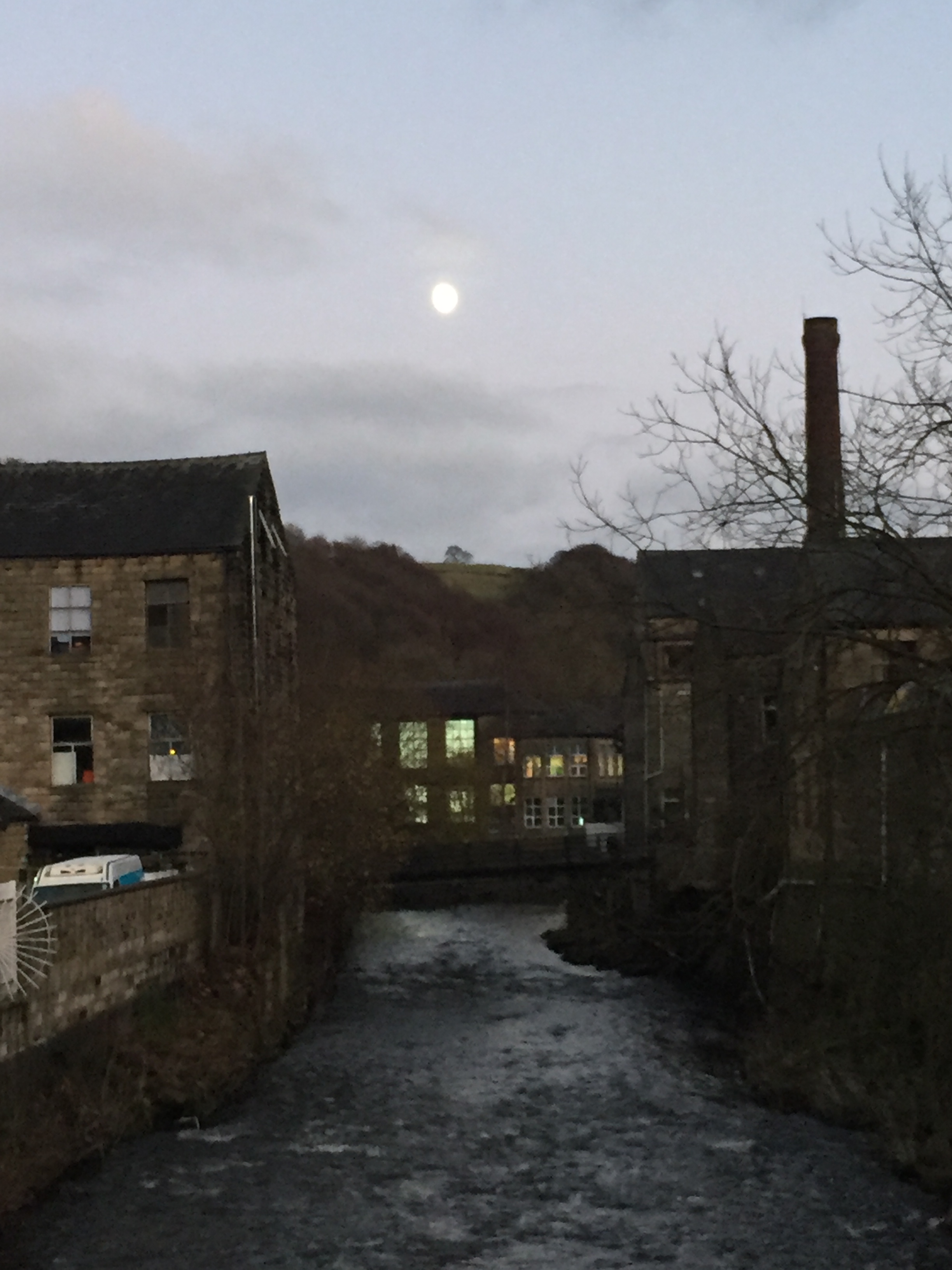
Almost dark. Back at Hebble End

Stairs leading up to Weasel Hall (photo from summer 2016)


Very clever. Get it?
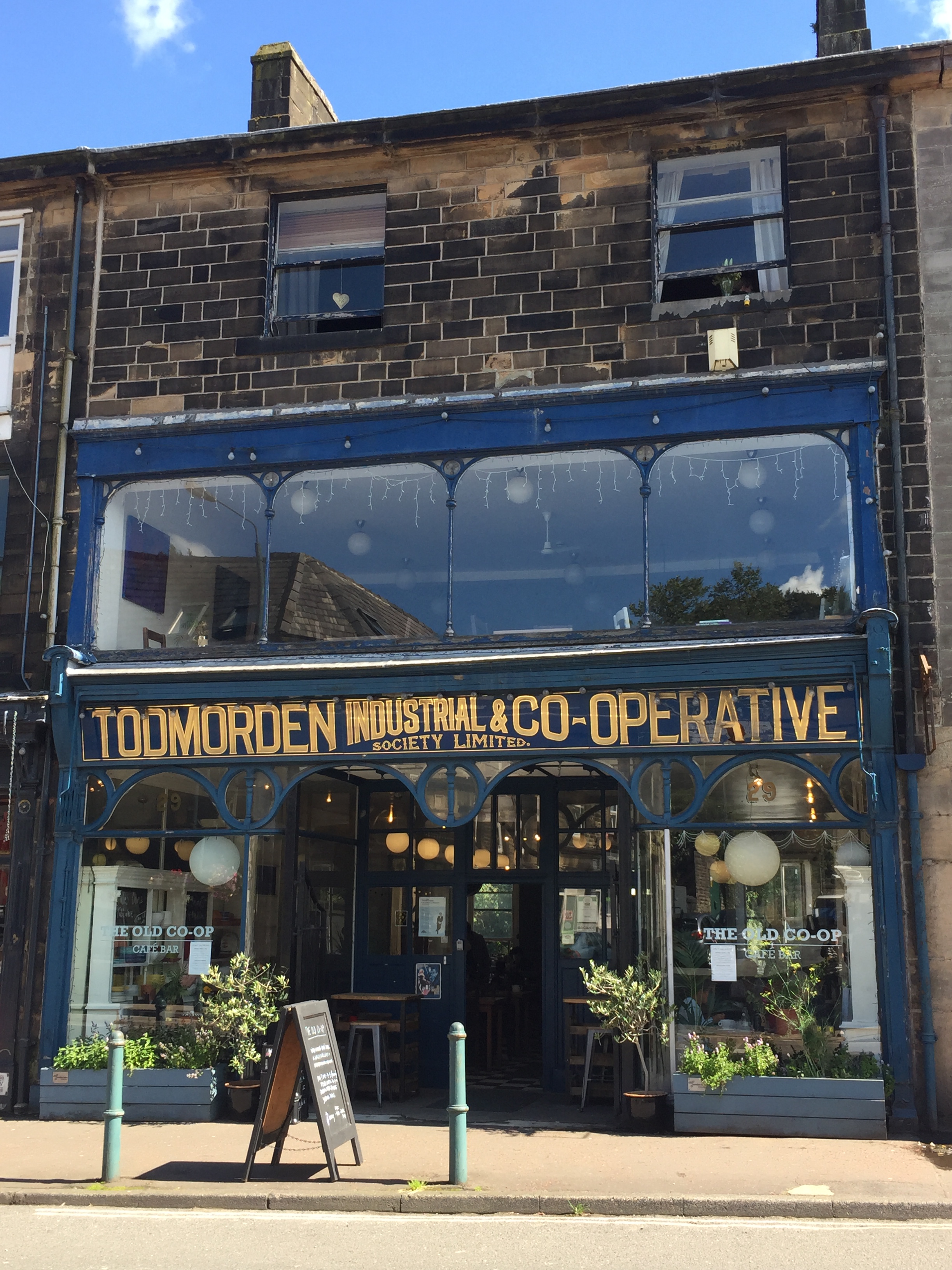
The Old Coop building has been turned into a very nice cafe. I’ve never noticed it before.

A delicious sampler of three Mediterranean salads and hummus
A
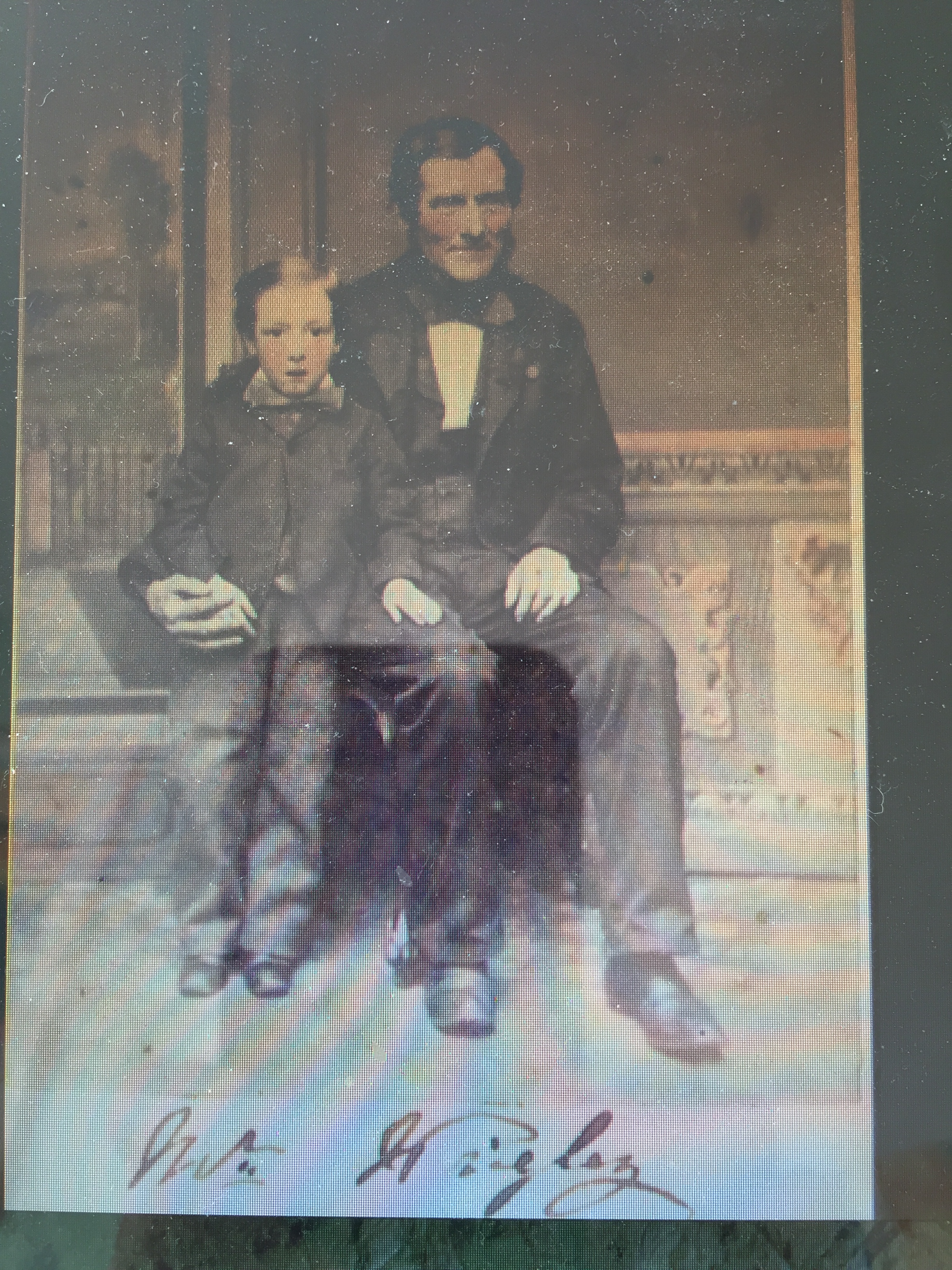
Then off to find the resting place of ‘Mister Wrigley.’ He was the brother of James Wrigley of Lily Hall, and therefore is my 4th great uncle.
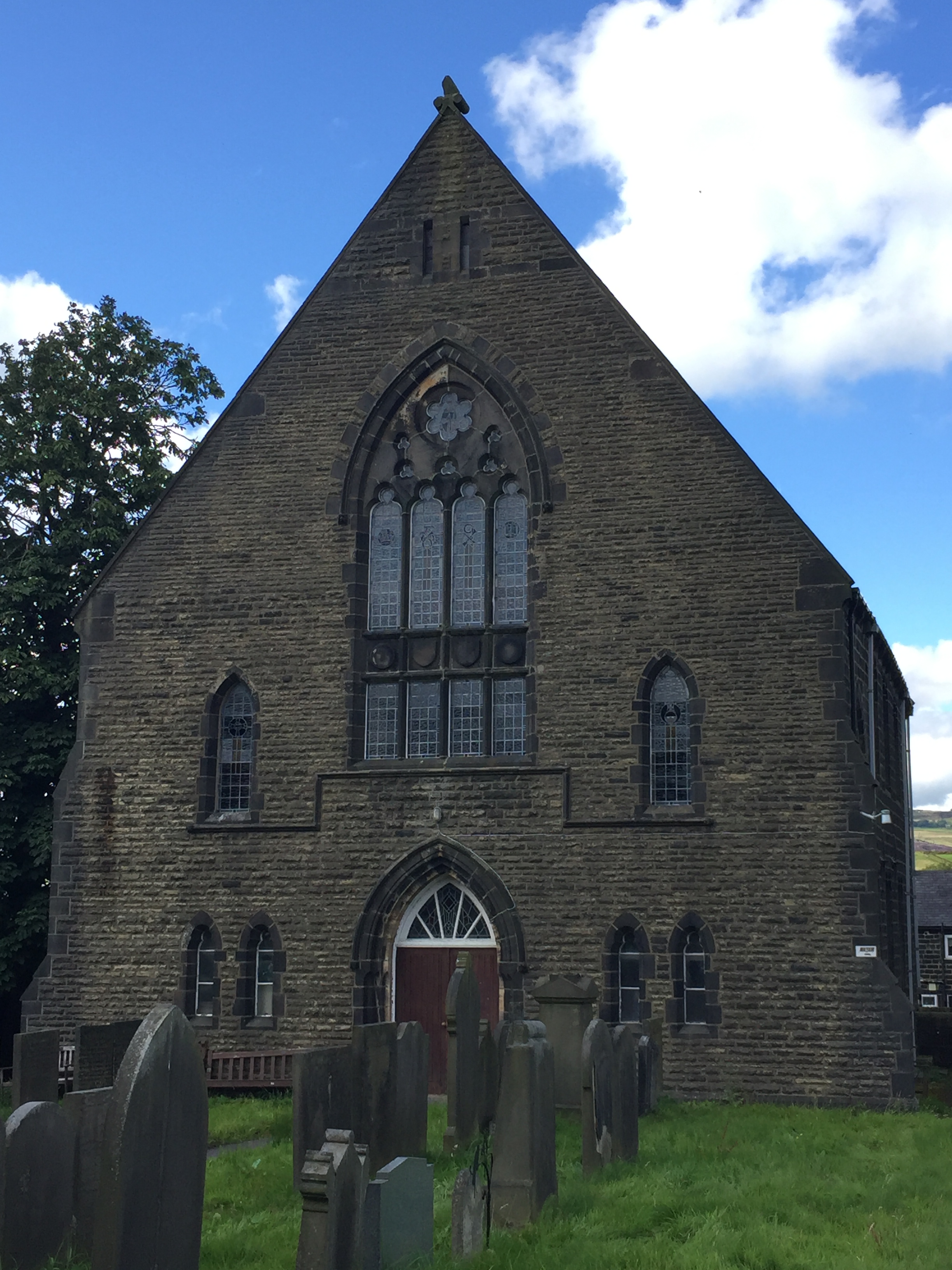
He is buried at this remote church in the tiny hamlet of Lumbutts which is just below Stoodley Pike. This was brand new territory for me, though I remember my mum talking about Mankinholes Youth Hostel which is about two miles away and I passed it on the bus.

It took me a while to find Abraham’s grave. he’s buried with his 17 year old daughter Mary Mally Wrigley.

Stoodley Pike from the cemetery

The imposing tower of Lumbutts Mill once contained three waterwheels, stacked up vertically.






[wpvideo WgxulL92]






















Recent Comments